The Chronicle
The independent news organization at Duke University





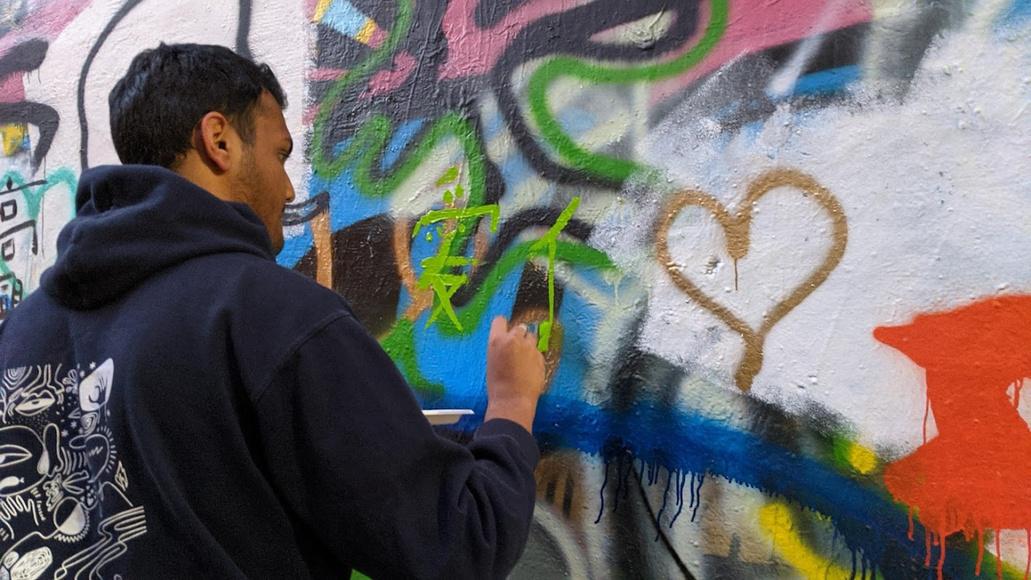
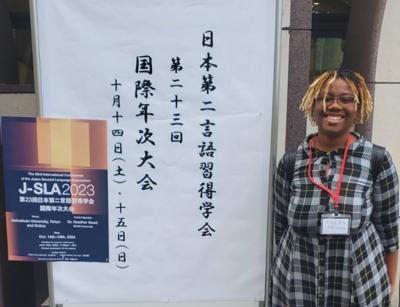
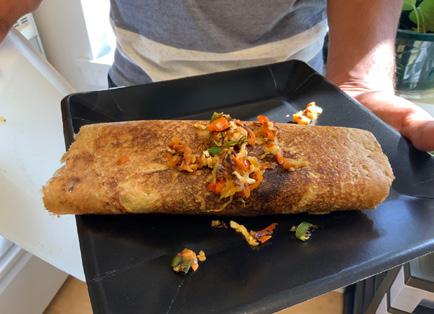
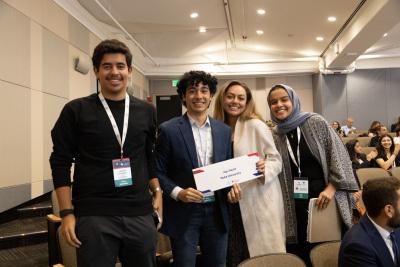
 By Jazper Lu and Mia Penner
By Jazper Lu and Mia Penner
January 9,
2024Thousands of Duke community members packed into Cameron Indoor Stadium Tuesday for Duke’s centennial celebration, commemorating 100 years since Trinity College became Duke University.
The event was hosted by actor and comedian Ken Jeong, Trinity ‘90, Lisa Borders, former president of the Women’s National Basketball Association and Trinity ‘79, and former men’s basketball coach Mike Krzyzewski. It also featured performances from student dance groups and appearances by select Duke community members.
With giant video screens displaying “1924” and “2024” in the background, the show kicked off with short performances from On Tap, Nakisai, Dhamaka, Street Med, Duke Chinese Dance and Devils en Pointe. A succession of videos and speakers followed, highlighting various stories that celebrated many of Duke’s achievements.
Jeong took the stage first, crediting Duke with his decision to become an actor after
taking an introductory acting course in his sophomore year.
“Being at Duke gives you opportunities you never thought you’d have,” he said. “It honestly made me who I am. Duke is home.”
Jeong joked that another “Ken-tennial” celebration would be held next week, earning laughter from the crowd. After a short introductory video showing shots of Duke throughout its history, including a segment showing the office of The Chronicle, Borders reminded the crowd that “we are all part of Duke’s future.”
“Duke is a place where each of us has the opportunity to make our own mark to be ourselves and to make an impact,” she said. “ ... Making an impact doesn’t always mean making a splash, like a lot of impacts, it starts out small.”
Borders proceeded to show a short video highlighting the stories of senior Isaiah Hamilton, president of Duke Student Government, and Keanu Valibia, a master’s student studying public policy and environmental management. Hamilton and Valibia then shared the stage with Borders.
Hamilton spoke about his and his classmates’ experiences navigating the uncertainty of the pandemic.
“It was the ability that we had to learn to embrace that unknown and persevere through those tough times that I think is going to be surmounting any other lesson,” he said.
A second video featured Anna GassmanPines, director of graduate studies in the Sanford School of Public Policy and professor of psychology and neuroscience, along with Felipe De Brigard, Fuchsberg-Levine Family associate professor of philosophy. After they both joined Borders on the stage, GassmanPines and Brigard spoke about how Duke’s fostering of interdisciplinary scholarship helped further their research.
“I’m a philosophy professor that works in the psychology and the clunky neuroscience of memory and forgiveness with a research project that has potential feedback for public policy,” Brigard said. “I need a place like Duke
See CENTENNIAL on Page 19
‘To kill a program’
February 28, 2024
Duke students involved with off-campus Greek life have experienced an increase in police responses to events through the 2023-24 academic year, with incidents spiking in January and continuing through February.
This new pattern has brought a wave of concern for Duke students who planned to rush, pledge or throw events for Greek organizations.
“Now that … a bunch of people got caught in a house, anxiety looms at parties about the idea of cops showing up,” said a Kappa Alpha Theta sister, who requested anonymity out of fear of retribution. “It was a lot scarier than it was before all those citations.”
Many students feel that this increase is unprecedented, and some linked the increase in police presence to the implementation of the “Good Neighbor Program,” a new initiative streamlining communication between Duke and partnered neighborhoods.
“One of the goals of the Good Neighbor Program is to provide students with the necessary resources and support for off-campus living, while promoting good citizenship within the community,” wrote Elinor Landess, director of off-campus and community life and associate dean of students, in an email to The Chronicle when asked about the students’ allegations.
“The program is designed to benefit all Duke students and neighbors living near campus, which includes Greek-affiliated students who live in near-campus neighborhoods,” she continued. “Our partnerships with Durham neighborhoods and the Durham Police Department are geared toward ensuring that all community members,
See GREEK LIFE on Page 19
February 15, 2024
The Duke Herbarium, one of the largest herbaria in the country, will shut down and have its plants relocated in the next two to three years, according to a Tuesday email obtained by The Chronicle.
“Duke will never be a leader in biodiversity like it was before,” said Kathleen Pryer, professor of biology and director of the herbarium since 2005. “... [Administration] just never discussed with us, never had conversations where ‘let’s put our heads together and see what we can do,’ [or] crowdfunding.”
In addition to Pryer, Professors of Biology Francois Lutzoni, Paul Manos, Rytas Vilgalys and Jon Shaw were informed of the administrative decision to shut down the herbarium.
The Duke Herbarium is the second-largest private university herbarium in the U.S. and is home to more than 825,000 plant specimens, including some specimens almost 200 years old. Universities across the world utilize the herbarium, which is a foundation for research in molecular, biochemical and cytogenetic studies.
Professors from the University of Michigan, the University of North Carolina at Chapel Hill, Texas Tech University, the University of California, Berkeley and the University of Maine have already expressed their anger with the decision to shut down the herbarium on X. A petition calling for the herbarium to stay
“What a way for Duke to celebrate its Centennial commitment to global biodiversity and climate change! Getting rid of its 100-year-old herbarium!”
open has reached over 1,700 signatories as of Friday afternoon, less than 24 hours after it was published.
“At the same time, we have carefully considered the requirements to maintain [the herbarium] in the manner in which it should be maintained, which would include multiple endowed faculty and staff lines as well as state-of-the-art facilities,” wrote Susan Alberts, dean of natural sciences and Robert F. Durden professor of biology, in the email to five professors of biology.
“We have concluded that because of this large set of needed resources, it’s in the best interests of both Duke and the herbarium to find a new home or homes for these collections. The collection deserves to be in a facility that has the resources to maintain it for posterity.”
“We see this is a loss for Duke and we fully appreciate that it is also a major loss for each of you personally, as you have devoted your professional lives to the important work of creating, maintaining, and studying it,” she continued. “But, we do see it as a net positive
in the long run for the collection and that is an important consideration.”
Pryer called the communication a “slap in the face to those of us who devoted our lives to this kind of research.”
“We are very sorry to learn that people felt the news was communicated suddenly and in a condescending way; this was far from our intention,” Alberts wrote in a Thursday evening email to The Chronicle. “We greatly value all the faculty, staff and students who have contributed to the herbarium over the years.”
Pryer says that alternatives were proposed to find funding and create a new building for the herbarium in the gardens, but these proposals were largely ignored.
“A Duke donor contacted me with a $3M proposal, and he wanted to contribute the first $1M. That is when Duke showed its true hand, and rather than use that as a springboard, they told us to shut down,” Pryer wrote in an email to The Chronicle.
While preliminary conversations with a potential donor did take place, the cost of
maintaining the herbarium, as well as its staff and faculty positions, would have cost at least $25 million, according to a Friday morning email from Kathryn Kennedy, association dean for communications and marketing.
Alberts wrote that they considered “numerous possible alternatives” before deciding to close the herbarium, in hopes of “ensur[ing] its preservation into the future.”
This decision, Pryer said, has much larger implications than just academia. The loss of such a large scientific collection affects not only the botanical community, but also those researching climate change and biodiversity.
Researchers across the globe use the herbarium for sequencing genomes, planting seeds of decades-old plants, and even discovering new species — a profoundly important method of combating mass extinction and researching the effects that global warming has had on the environment.
“What a way for Duke to celebrate its Centennial commitment to global biodiversity and climate change! Getting rid of its 100-yearold herbarium!” Pryer wrote.
Alberts told herbarium staff that the majority of herbarium should be moved within the next two to three years.




When I submitted my transfer application to Duke, I had no idea about the exhilarating journey ahead of me.
Initially, I was unsure of how I would fit into the University community — it seemed as if everyone had already made their friends, that leadership positions in clubs were already solidified and that I would be stuck in a transfer bubble, unable to truly feel like a Duke student.
Yet, what I found was quite the opposite. What I ultimately find so special about Duke is that no matter what journey brings you here, there is a place for you on campus to embrace your interests and meet people who are just as passionate about the same things as you are.
In particular, when I shyly walked into The Chronicle’s info session August 2023, I was in awe of the passion I saw from the past leaders of the paper and how excited they were to invite the new cohort of reporters.
After just a few weeks working for The Chronicle, I learned about the hustle and bustle that defines Duke. Our community members know what they want, and they go after it. They are pioneers of change and uphold themselves to the highest standards, with passion as their guiding compass.
The Chronicle is here to both tell you these stories and show you what it means to witness and be a part of it all.
Throughout the summer, we kept a close eye on the changing higher education landscape following the Supreme Court’s decision to strike down affirmative action. We also covered the unionization of graduate students, nearly seven years in the making.
Come FDOC, we were launched right back into the regular news cycle, reporting on the New York Times Magazine article describing Duke as among the “least economically diverse” elite colleges, the Baldwin Scholars lawsuit showcasing the immediate effects of the end of affirmative action and the effectiveness of Duke’s emergency response system following the UNC shootings.

It was also a thrilling year where Duke momentarily experienced the feeling of being a football school. Duke’s electric home-opener win against No. 9 Clemson sparked a passion for football rarely seen here. The Chronicle was there to cover the
game, student reactions and College GameDay’s first appearance at a Duke football game.
But we also reported on more difficult topics like the Israel-Hamas war on Oct. 7 and how different student groups reacted, from painting the Free Expression Bridge to holding vigils and calling on Duke to take a stance. When some Class of 2024 graduates walked out of Commencement to call on Duke to divest from Israel — The Chronicle was there once again. Our reporters work to capture the passion of these student groups as they stand up to rally together to support their cause.
As Duke’s independent student newspaper, we also strive to hold University administration accountable. We broke the story of Duke’s decision to close down its 100-year-old herbarium and have kept a watchful eye on the University’s promise to uphold its Climate Commitment and diversity. Yet, we also bore witness to an administrative feat when the Arts & Sciences Council passed the new Trinity curriculum, placing a greater emphasis on the humanities.
Still, there was so much to celebrate this year. As Duke marks its 100th year, The Chronicle has reported on its past, present and future. Whether that be through highlighting influential figures and events at the University or the boisterous kick-off celebration, The Chronicle is honored to be in the position to document it all.
This is all to say that one constant I’ve witnessed throughout my time at The Chronicle is that Duke exudes passion. Whether that be through our world-class faculty research, ambitious students or anything in between, being a part of The Chronicle has allowed me to delve into the different pockets of this incredible university and led me to eagerly tap my feet, waiting to report on what’s to come.
Ultimately, none of this coverage would have been possible without our incredible reporters. Their commitment to uncovering the truth is unparalleled, and I am honored to work alongside them. And while the job isn’t always easy, there’s nothing late night McFlurry runs, Chron movie nights or our semiformal and formal can’t fix.

As we look into next year, anticipating the twists and turns and the known and the unknown, we’re eager to welcome in a new set of reporters to take up the mantle and guide the paper into its future. If you’re interested, we hope you’ll join us. You don’t need any prior experience and, barring the opinion section, don’t need to submit an application.


You’ve heard all about news, but what about sports? Our sports department covers all 27 Blue Devil teams in the NCAA. Who knows — maybe one day you’ll get to report on a Duke-Carolina basketball game. But we cover far more than just basketball, including our nationally acclaimed lacrosse, track and field, softball and field hockey teams. Our sports department also highlights athletes who use their platforms to make a difference, in addition to writing prop bets, X-factor and other columns during the basketball season.
In the opinion section, you can spark community debate or dish your hottest takes. Take one of our columnists as an example, who made a case for students to be able to take more than six classes a semester. If you have a knack at humor, apply to be Monday Monday, our anonymous satire columnist.
If you’re interested in the arts scene, join Recess, our campus and local arts section. Take your shot at a movie or food review, or write a feature on Duke and Durham’s talents. Recess has three sections — arts, campus and local — providing an array of opportunities to explore your interests.
We’re a digital-first media organization, so we are always in the market for photographers, videographers, graphic designers and podcasters. In the photography department, you can capture live shots of Duke students in action, noteworthy events, famous speakers and any of Duke’s sporting events. Yes — that includes basketball! If many of our sections interest you, fear not because you can work for multiple sections. Your Chron experience is what you make of it! Whether or not you chose to join us, I encourage you to keep up to date with our daily coverage of Duke on our website and social media.
I am so thankful for how The Chronicle has allowed me to grow and to meet people with varying passions and goals. And I hope that it can serve you too. No matter what, we will always be here, chronicling all that is Duke.
We titled this year’s send home edition Passion. It’s what drives us all forward, what has marked 100 years of Duke and what will continue to guide the University into the future. This issue aims to capture that energy and the passion The Chronicle, too, has for serving the Duke community.



faculty reflect on the effects of grade inflation post COVID-19
Undergraduate grade distributions at Duke have risen steadily through the 2022-23 academic year, furthering trends of high grade point averages across Trinity College of Arts & Sciences and the Pratt School of Engineering.
Duke’s Office of the University Registrar collects and reports class percentile data each semester, dating back to fall of 2014. This information captures the minimum cumulative GPA for students placed within the top five, ten, 15 and 25 percent of their class segmented by grade level and semester. GPA cutoffs are used to designate students who graduate with Latin honors and other academic distinctions, including Phi Beta Kappa.
Throughout eight years of publicly available data, several academic trends have persisted, including rising GPAs.
Cutoff GPAs for each percentile tier have tended to increase every year, with a notable jump taking place after the start of the COVID-19 pandemic — the spring 2020 semester and beyond. GPA levels corresponding to percentiles decrease as students progress through their time at Duke.
Frank Blalark, associate vice provost and university registrar, argued that the high GPAs reported by the registrar’s office are not a result of so-called grade inflation, but rather a continuation of past excellence.
“Analyses of grade inflation can be nuanced and challenging to describe,” Blalark wrote in an email to The Chronicle. “Historically, Duke has never had a high number of D or F grades. C grades have a statistic, but they are still outliers compared to A and B grades. Meaning, the overwhelming majority of grades for Duke undergraduates fall into the B- to A+ range, and our collective [cumulative] GPAs also oscillate around 3.500 +/-.”
At Duke’s peer institutions, GPA levels vary. A survey of 471 members of Princeton’s 2022 graduating class found that 39.3% of respondents finished with cumulative GPAs at or above 3.8. A similar survey conducted across Harvard’s 2022 graduating class
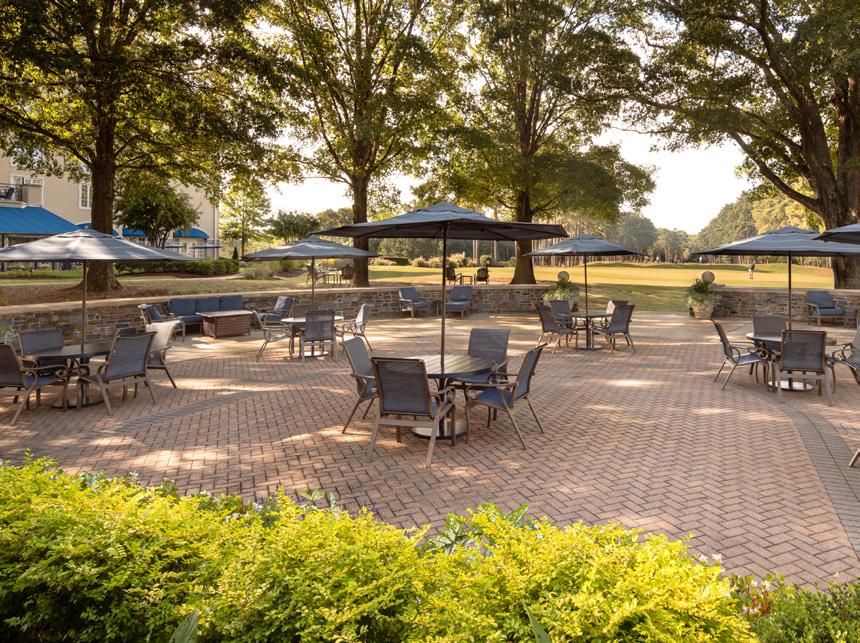

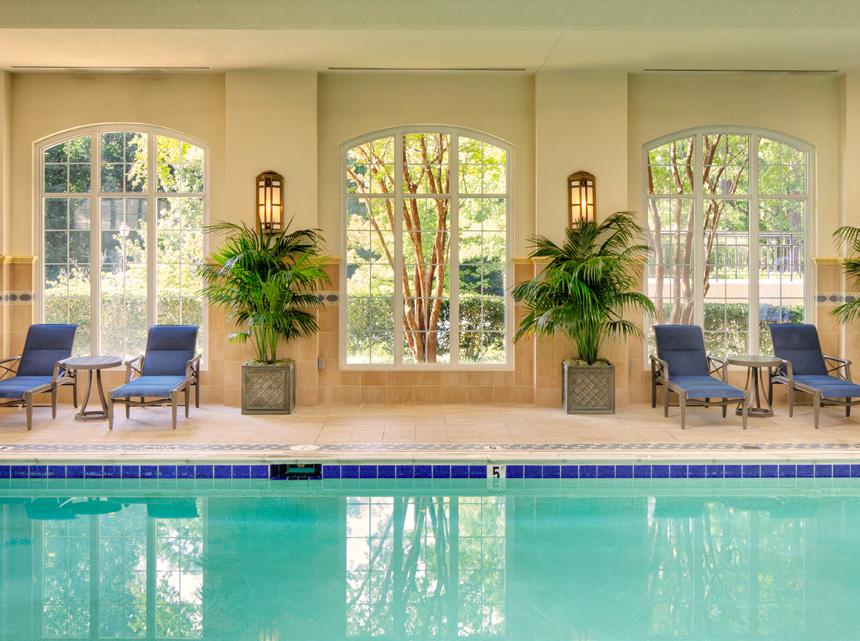
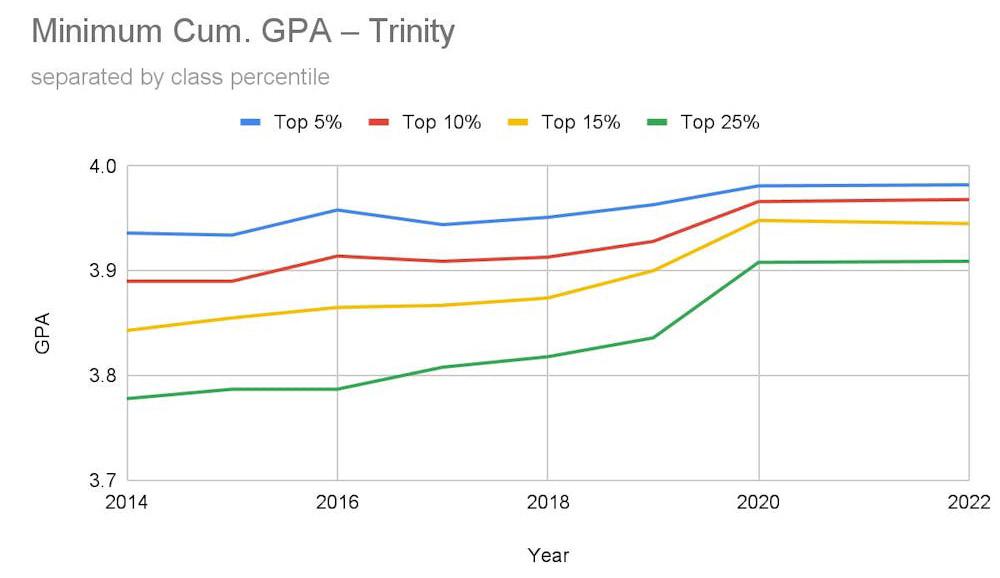
found that 71.1% of respondents ended their four years with a cumulative GPA greater than or equal to 3.8.
Some GPA data, including class percentile data, is available at the Office of the University Registrar’s website as well as several other publicly available dashboards of enrollment and demographic information. More information about GPA trends at Duke, such as GPAs disaggregated by major, is either unavailable or private.
Why has the trend accelerated post-COVID-19?
Many students believe that a potential factor for increased GPAs during the COVID-19 pandemic may be an increased reliance on
virtual classes and take-home assignments, giving students additional time and freedom to complete their work at their own pace — with outside resources and limited monitoring.
However, Brandon Fain, assistant professor of the practice of computer science, has another idea.
“I have not seen a consistent increase in grades in my courses over the last several semesters. However, I have roughly only been teaching since the pandemic, so it’s difficult for me to see the before/after impact of COVID specifically,” he wrote in an email to The Chronicle. “If I recall correctly, early COVID semesters adopted a policy that made it very easy to take a


course on a satisfactory/unsatisfactory (S/U) basis. That may have had an impact.”
Senior Anya Gupta, who enrolled at Duke before the pandemic, agreed with Fain’s assessment. She described the prevalence of using S/U policies to preserve GPAs, and how such a strategy was not popular before the pandemic.
Some major courses at Duke have recently adopted S/U grading structures, including the introductory courses in public policy and economics. Students can also now change up one course per semester to S/U grading, which counts toward graduation and general education requirements, while still maintaining eligibility for semester honors like Dean’s List.
To Gupta, the higher GPA cutoffs for Latin honors are “frustrating” and give employers a “really skewed” perspective that they wouldn’t be getting had she performed similarly at another school.
“I think I have probably like a 3.8, but I was looking at the website and was like, man, I wouldn’t qualify for a single one of these,” she said. “It’s crazy.”
The shrinking margin for error to achieve academic honors is also a concern for junior Chloe Decker, who says that the higher cutoffs disadvantage certain students over others.
“The cutoffs being so high takes away their relevance for many students who are pursuing majors or minors in fields that are graded on curves, or naturally don’t award A’s to the majority of the class,” she said. “It also leads to toxic rumors regarding certain professors who give out more B’s, since earning one would essentially take you out of the running for most of the Latin honors cutoffs.”
Decker also spoke about her personal experiences adjusting to grade inflation as a prospective law school applicant. She said that she sometimes shied away from taking courses where lower grades were more likely to remain among the higher GPA percentages.
“In conversations with other friends about which language courses they’re willing to take at Duke, sometimes they act surprised that I specifically chose to take Mandarin Chinese since it’s regarded as one of the more difficult language pathways here,” Decker said.
Cautiousness towards grade inflation is not universal at Duke, however. Senior Erik Dahlberg isn’t too alarmed by the trends.
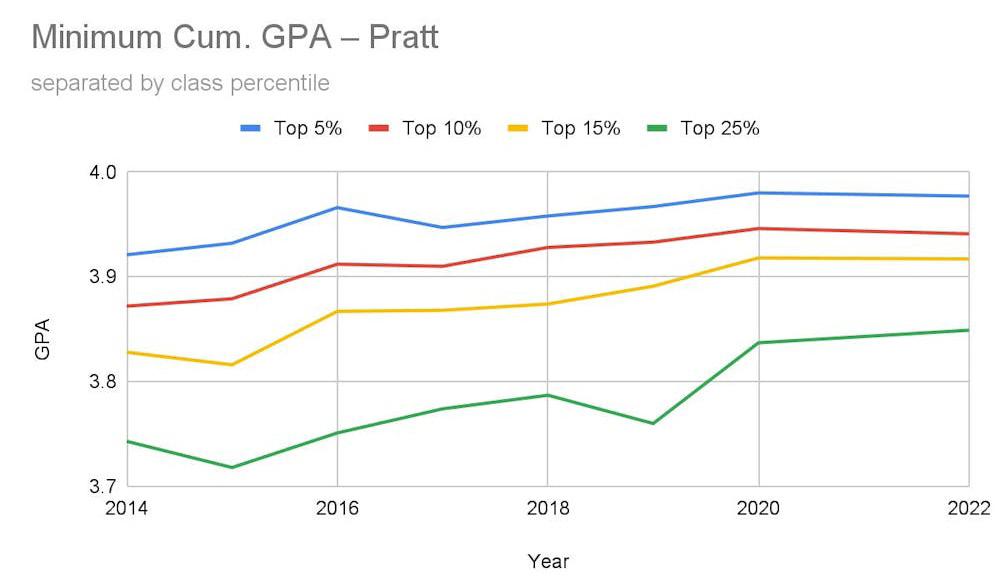
GPA cutoffs for class rank percentiles have risen among undergraduates over the past eight years, similar to the trend in Trinity College.
“It’s something that I haven’t really thought too much about in my classes because the grades that everybody else is getting doesn’t really affect me,” he said. “It doesn’t strike me as something that is necessarily harming the student experience or how much students are learning.”
Dahlberg also isn’t worried about competitiveness when searching for jobs, emphasizing that GPA is only a small component of a job application.
Junior Julian Camacho also agrees that grade inflation is not something he is “too concerned about.”
“It might make things more competitive, but honestly, things are really competitive regardless, and they will be anyway,” he said. “I don’t think my life or death hinges on whether or not this grade inflation will get me or cost me a job.”
Grade inflation, however, may have affected Camacho’s role as a teaching assistant for MATH 122, Laboratory Calculus II with Applications. He noticed that students give him regrade requests for “absolutely everything,” which he believes may be attributable to the increased competitiveness for the highest grades.
Gupta also added that a consequence of increased competitiveness for higher grades may be a disadvantage for students hoping to work in the public sector which “really value hard skills.”
“When everyone around you is … trying to get a good GPA, you avoid those hard skill based classes that will make you stronger in the workforce because you don’t want to sacrifice your numbers,” she said.

Class of 2024 seniors share words of wisdom to incoming Blue Devils
By Rebecca Fan May 7, 2024The Class of 2024’s college experience is defined by its unconventional nature. Duke’s recent graduates began their first year amidst the COVID-19 pandemic, leading them to watch the University shift from an insular campus community to one blossoming into its 100th year four years later. Our seniors have learned to adapt to and persevere in a constantly evolving world to forge a meaningful college experience.
The Chronicle asked three members of the Class of 2024 to share advice and lessons they have learned throughout their time at Duke with the incoming first-years. Here is what they said.
What would you say to first-years at O-Week who are just getting their bearings in this huge new place?
Taylor Glatt: Take your time adjusting to college. It’s a whole new world and lots of new people to meet and things to do. What we thought Duke looked like as freshmen was not even close to what it has been the past three years. It will work out — maybe not the way you initially pictured your life to be. However it does, you’ll find your own joy and happiness.
Dharshan Varia: Take every opportunity, but take every opportunity that makes you happy. Don’t feel like you have to do everything. Try out as many clubs as you can to see what is fun and interesting. Duke has so much to offer. If it takes time to figure out what that is going to be for you, that’s totally okay.
Celia Vergara: Your priorities, your friend groups and the things that you are doing is going to shift in the next several years. Don’t be afraid of that, and take advantage of every moment you can with the people and things that you’re doing now.
How would you recommend spending time outside of class?
Glatt: I’ve spent most of my time either doing activities or just enjoying my friend’s company. I’m the co-chair of the Student Dining [Advisory] Committee and a volunteer at Puppy Kindergarten, which were some of the most meaningful things I did
on campus. My favorite moments have been with my best friends, doing random things on a Wednesday afternoon or getting ice cream any day of the week.
Varia: So I like to say that my second home on campus is BC Plaza. I love hanging out, seeing so many different people [and] getting to know other people. For me, Duke has been about the people making the place.
Vergara: Find at least one extracurricular thing that you’d like to do. Have something that you are looking forward to every single day and something that you’re going two continue to build.
How did you know that you were pursuing something (a major, for instance) that was right for you?
Glatt: I came in as a global health and Spanish double major. Once I got here, I really had no idea what I was doing, besides the fact that I was pre-med. And I just took the time to explore and speak with professors to help me figure out what suited my interest, and I ended up as a Program II major.
Varia: I came in not knowing what I was going to do. I was an economics major for a while, went to public policy, went back and forth and redeclared my junior year. Prioritize the classes that make you happy and that you’re genuinely interested in.
Vergara: I came into college not knowing my major. But I ended up taking computer science during my freshman spring. I fell in love with it, and I just kept going with it.
Any advice on balancing academics with extracurriculars, social life, hobbies and everything else?
Glatt: I think sometimes you have to prioritize academics and sometimes you have to prioritize your friends. By far the thing I’m most proud of leaving college are my friendships and those relationships that I’ve built. So sometimes that means staying up late to complete an assignment because you hung out with your friends all night. What helped me complete my academics and be successful is having the support of my friends and being reenergized by spending time with them.
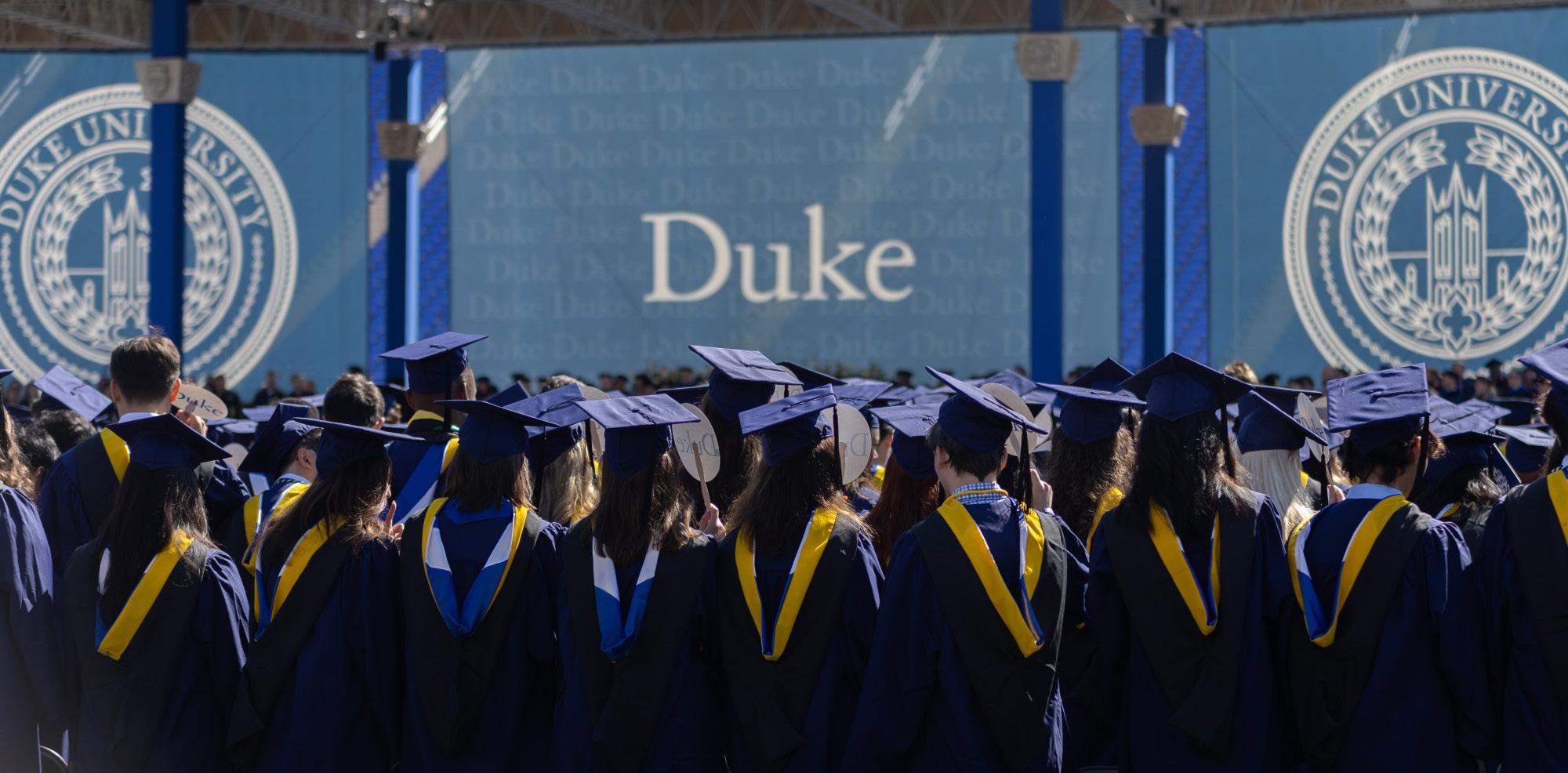
Varia: Make sure you have a chance to do the extracurriculars or things you want to do, but also able to take the classes you want. Pick a schedule, make a life for yourself that you’ll be happy with, that you’ll look back on your experience fondly with.
Vergara: The “work hard, play hard” mentality is very real. Break up the things in your life. You got to do homework, and you got to do your fun stuff with your friends. You also need a little bit of time for yourself that lets you recharge after all of these things. Establish that rhythm that works for you as soon as possible.
What is something you wish you could have done or known more about before you graduated?
Glatt: Give myself more grace. There’s so many things and opportunities pulling you in every direction here, and you’re never going to be able to do it all. Do what makes you happy — not necessarily what your friends are doing, or what you think will look good for a job or a grad school application. Be kind to yourself everyday. I wish I had been better at that as a freshman.
Varia: Something I would have wanted to be intentional with was tapping into the alumni network. Get to know people and figure out what your passion is. Don’t feel like you have to do something because everyone else does it.
Vergara: I wish I had taken more advantage of getting closer to my professors, doing FLUNCHes and generally just staying after class, asking questions and going to office hours. I never made the time for it and I think that I would have really benefited from having developed a mentor within my major.
‘Wealth is ubiquitous’Tiffany Chen
What are the most important lessons you learned during your time at Duke, or any words of wisdom that you’ve carried with you throughout these past 4 years?
Glatt: Saying “yes” to things that I might not have expected that I wanted to do or might have been hesitant to do. All those unexpected tiny moments of hanging out, staying up till 2 a.m., rehashing the exact same topic over and over again — those are the moments that I will take with me long after I leave. Academically and extracurricularly, the things that I applied to randomly as a freshman and said “yes” to have led to some of my favorite moments on campus. Embrace the unexpected, embrace the unknown — really just embrace “yes.”
Varia: Find your people and don’t settle. It takes a while to put together that village, but I think your life will be so much more fulfilling when you find the right people instead of forcing people who aren’t going to stick around. Don’t be scared, take risks. Also, challenge the mindset that everyone else has to do. You will get so much more respect from your peers and yourself if you prioritize your passion.
Vergara: Surround yourself [with] people who are smarter and more accomplished than you at the things that you want to be good at. It is so easy to find people that you can latch onto and learn from. My absolute favorite part of my experience has been calling all these incredibly amazing people my friends. That being said, if you have somebody in your life who is holding you back, don’t be afraid to drop [them] and move on.
Editor’s note: This story has been edited and condensed for print.
Students react to NYT article naming Duke as among ‘least economically diverse’ elite colleges
By Abby Spiller September 14, 2023Following a Sept. 7 article in the New York Times Magazine that described Duke as falling substantially behind peer universities in socioeconomic diversity, several students resoundingly agreed with the article’s findings but remained uncertain on whether it will push the University to increase socioeconomic diversity in future student bodies.
The article, which described Duke as the “exception to the exception” among top-ranked universities, cited a July research study published by Opportunity Insights, a nonprofit organization run by Harvard economist Raj Chetty, which stated that only 12% of Duke students in “recent years” were Pell Grant eligible.
President Vincent Price wrote in a message responding to the article that 17% of the Class of 2027 is Pell Grant-eligible, and that the University remains “firmly committed to building on our recent recruitment efforts.”
However, sophomore Caroline Joo said that although Duke promotes racial and ethnic
diversity, she has yet to meet many students who are on financial aid. Even among students she knows who are on financial aid, Joo does not believe that she has met anyone in the bottom 50th percentile of household income.
“I definitely agree with the sentiment that wealth is ubiquitous on Duke’s campus,” sophomore Carly Pyles said. “As a student and child of a faculty member at a private high school in Brooklyn, I thought I had already been exposed to the highest levels of affluence. In my opinion, Duke is at a whole new level.”
Beyond the numbers, some students believe the socioeconomic divide is most evident in the social scene.
For junior Anjali Kapadia, socioeconomic disparities on campus are most apparent across dominant extracurricular activities, including Greek Life, club sports and other selective groups where students are required to pay dues to participate. These barriers to entry, she said, emphasize the lack of accessibility on campus for low-income students.
Junior Victoria Ely, a first-generation student, pointed out a dilemma many first-generation students at Duke feel upon joining the campus community.
“You want to be involved, and you want to feel like a normal Duke student, but there are just so many obstacles to doing so,” she said. “Yes, I got in. But what happens after?”
In navigating her time at Duke, Ely said that the Duke Low-Income First-Generation Engagement office has helped positively shape her experience. Older Duke LIFE students gave Ely and other incoming Duke LIFE students tips on how to navigate Duke’s expensive social life, which they would have otherwise not known.
Kapadia and Joo said, aside from Duke LIFE, they are unaware of the resources available for low-income students at Duke.
“Even just the very small things that happen, I just feel that, not necessarily personal attacks to low-income students, but you’re really just trying to make it so much harder,” Ely said. She added that the replacement of Panda Express, which students viewed as one of the few affordable on-campus dining options, further limits food choices for low-income students.
Despite a desire to see change, Kapadia and Joo emphasized the concept of Duke as a “business” that seeks to maximize its profits. They are unsure
of whether the administration is both willing and able to truly increase socioeconomic diversity.
“One thing the Times article said is how if [Duke] increased to 25% of Pell Grant recipients, [Duke] would end up losing around $10 million per year in tuition money,” Kapadia said.
Despite optimism from University administration, Kapadia said she is not surprised that progress continues to be stagnant. Students must make persistent efforts to ensure that the administration actually keeps their word, she added.
Ely noted that after the release of the New York Times Magazine’s article, she felt like the focus shifted to the “optics of admitting more lower-class students.” However, she notes that there “also has to be a focus on what you do [to help] those students.”
“We are at the worst of the elite, but in [the] aggregate, everyone needs to be better … I think what Duke could take this as is a chance to be the best,” Kapadia said. “I think we will all look back as a university and be like, ‘Wow, we should be proud that we took this step that was needed long ago, but at least we were the ones to be at the forefront of change.’”
Holly Keegan contributed reporting.
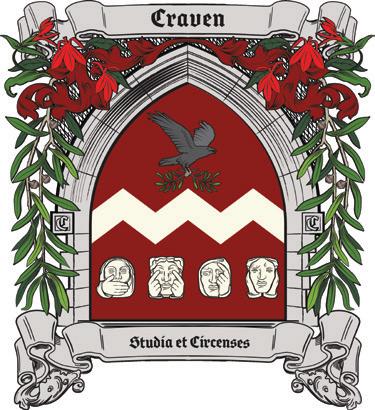





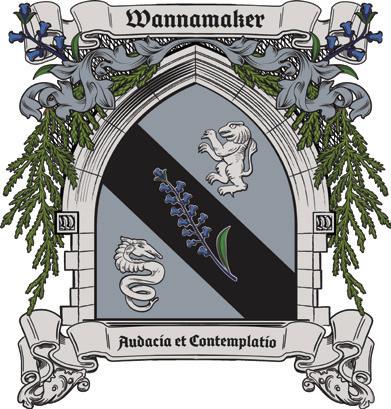
*Dates may be subject to change.
Saturday, August 17:
First-Year Move-In East Campus
Friday, August 23:**
**Upperclass move-in continues thru Sunday, August 25
Upperclass Move-In Swift and West Campuses
Additional information about move-in will be emailed later this summer.
What is my room assignment?
Who is my roommate?
What are my building/quad amenities? Who is my Residence Coordinator? More questions? Email housing@duke.edu
A few spots remain for the life-changing leadership opportunity!
•Free single bedroom and partial meal plan
•Open to upperclass undergraduate and graduate students
•Stipend, paid quarterly
•Work that matters
Email question to rlselections@duke.edu
Housing Assignments: 919-684-4304; housing@duke.edu
Swift (300, 301, SmartHome): 919-684-5813; rlhs-eastswift@duke.edu
East Campus: 919-684-5320; rlhs-east@studentaffairs.duke.edu
West Campus: 919-684-5486; upperclasscampus@duke.edu

October 19, 2023
Duke painted over a portion of the East Campus Bridge after multiple community members reported that it contained an antisemitic phrase, according to a Thursday email from Student Affairs.
In the email sent to Duke undergraduate students, Mary Pat McMahon, vice provost and vice president for student affairs, wrote that Duke had painted over the phrase “from the river to the sea, Palestine will be free” on the East Campus Bridge, officially known as the Free Expression Bridge.
Before the phrase was painted over, another person or group had painted the addendum “from Hamas” next to the phrase, making it read as “from the river to the sea, Palestine will be free from Hamas.”
McMahon wrote that Student Affairs received concerns that the phrase was “associated with an erasure of people and antisemitism.”
The phrase that was painted over has been used since the 1960s in various contexts as a Palestinian freedom call. The phrase, and its alternate forms, are frequently used in demonstrations in support of a Palestinian state, advocating for varying degrees of territorial claim, depending on the context.
Critics say that the phrase, which has been adopted by Hamas, calls for the land that comprises Israel and Palestine — from the Jordan River to the Mediterranean Sea — to be placed entirely under Arab rule, ultimately advocating for the elimination of the State of Israel.
“Because the phrase, ‘from the river to the sea….’ is understood by many in our community and beyond as a call for violence targeting the Jewish community, the specific phrase was painted over,” McMahon added in the email.
Student Affairs took care to “not alter other sentiments elsewhere on the bridge,” including those that advocate for Palestinian rights and “call for Palestinian freedom.” As of Thursday morning, a

Palestinian flag painted with the phrase “Free Palestine” under it remained on the bridge.
Duke’s policies surrounding the bridge state that “individuals and student groups may express opinions within this area that are not restricted by content, except by legal standards.” However, there are no restrictions on “painting over the sections of the tunnel that other people or student groups have painted.”
“In the face of wrenching conflict and war, a university serves a crucial role as an educational community that fosters civil discourse, critical inquiry, and openness for all viewpoints and positions,” the
email read. “The recent war has already resulted in thousands of innocent lives lost. Many in our community are profoundly affected. Duke does not condone violence or threats of violence directed toward any members of our global community or within our family here on campus. ” President Vincent Price had previously released a statement on the Israel-Hamas war urging respectful debate and discussion among Duke community members.
BRIDGE on Page 20
Why History? History at the college level is not about names, dates, and exams. It’s about using advanced tools to understand why the world is the way it is, and where it might be going. If you are interested in law, business, racial justice, or climate change, Duke's History department may be right for you.
A History major gives students applicable, real-world skills in writing and research, and opportunities to work together with peers and faculty members to gain insight and contribute new knowledge to the study of the past. Understanding how to approach the unknown- and how to convey your work with clarity and confidence- is the key to success in every venture!
For a complete listing of our Fall 2024 offerings

Consider History as the path toward your brightest future.









So... You did that. (Congratulations!)
What Now? The Duke Guide to Happiness, Purpose & Well-Being offers seminars designed to help you thrive at Duke and beyond.
▪ An innovative course-based experience for first-year students
▪ Fulfills Seminar or Writing 101 requirements
▪ Courses offered Fall & Spring
▪ Earn 1.5 credits
Register for a What Now? seminar, and you’ll also add the What Now? Common Experience workshop. Here, you’ll meet more faculty and engage some of Duke’s best resources for intellectual growth, wellness, and stress reduction. THE COMMON EXPERIENCE:
HOW TO JOIN:
What Now? is open to all first-year students! No need to apply. Simply find a seminar with space and enroll.
The Student Organization Finance Committee rejected $71,000 out of $100,000 student organization funding requests in late March, forcing some groups to limit their programming due to insufficient funds.
SOFC, a committee within Duke Student Government, is responsible for allocating an annual budget of $1,000,000 to over 350 undergraduate student organizations.
Sophomore Tyler Harris, co-founder of Duke Drone Racing, said his club requested SOFC funds to attend the Collegiate Drone Racing Association’s National Championship. Harris attended the office hours of an SOFC representative on March 22 to see if his club qualified for funding.
In their meeting, Harris said the representative told him that SOFC “stopped having briefings or funding meetings for trips specifically for student groups two weeks ago” and that “there was no more funding for group travel anymore this semester.”
SOFC did not respond to The Chronicle’s request for comment on whether the organization is no longer accepting certain funding requests and whether student groups have been told they can no longer apply for such funding.
After the funding request was denied, Duke Drone Racing paid for flights and lodging itself. Club members will also pay for event registration, food and a rental car, which Harris says has limited the number of people the club can afford to bring.
Sophomore Katherine Chen, co-president of the Duke TaiwaneseAmerican Students Association, believes that SOFC has become stricter by requiring student organizations to provide invoices with their funding requests. Chen believes “they’ve been enforcing [the rule] more within the last few weeks.”
Chen noted that her organization was not informed about the rule that funding requests had to come in two weeks before an event, which led TASA to cancel two of its events this semester. TASA did not submit their funding request in time for its first event and was not able to send an invoice on time for the second event, Chen said.
Chen believes her experience with the funding process could improve if SOFC set “clear dates and deadlines” to notify student organizations about their funding requests.
Policy changes
SOFC’s funding cuts follow three DSG closed executive sessions since Feb. 22. The first executive session arose from an impromptu vote after a senator raised concerns about the extent of remaining SOFC funds.
SOFC announced in a Feb. 29 DSG meeting that it lowered lunch and dinner allocations by $2 per person in certain funding requests, attributing the change to an influx of funding requests for events after spring break.
SOFC representatives stated March 6 that it had saved $4,800 in funding to student groups by reducing meal allocations. During the meeting, the senate also held two separate planned executive sessions, at least one of which was to discuss “financials.”
In DSG’s March 27 meeting, DSG SOFC Liaison Ariella Ruiz addressed the $100,000 in SOFC funding requests from that week, of which SOFC allocated $29,000. In March 2023, SOFC received only $30,000 in total requests.
Ruiz announced that SOFC plans to review its policies and guidelines through April and will accept senator feedback throughout the process.
SOFC Chair Ayanna Chatman, a junior, did not respond to The Chronicle’s requests for comment about how SOFC deliberates on large funding requests and how such deliberations have differed from past years.
The DSG senate must approve SOFC-recommended allocations above $1,500. Each senator has the option to vote for or against the proposed allocation. Senators can also vote to table the matter, abstain or excuse themselves due to a conflict of interest.
First-year senator Olivia McConnell and sophomore senator Dylan Cawley do not recall DSG voting down any SOFCrecommended allocations this year. However, they say there have been instances in which legislation was tabled and modified
collaboratively by SOFC and the affected student organization. McConnell, a member of the DSG academic affairs committee, described her thought process when voting on legislation.
“I start with the working assumption that SOFC [officers] are phenomenal at their jobs and that they have an exorbitant amount of financial expertise,” McConnell said.
If SOFC recommends a total allocation, McConnell considers whether the allocation is within the budgetary code. If SOFC suggests a cut, McConnell determines whether the event can still function to the required caliber. If the answer to these questions is yes, McConnell votes to move forward. If not, she will motion to start a debate.
“Usually by the time we’ve asked all of our questions, the concerns are mediated,” she said. “If not, then we always have the opportunity to send it back, have it revised and vote on it again.”
McConnell said she has voted against proposed allocations “a few” times. She noted that she participated in one debate concerning why a student group chose to fly to Washington, D.C., rather than take a less expensive bus.
“By the time we were reviewing the funding allocation, the flight logs were already in place,” she said. McConnell voted to continue with SOFC’s recommendation to revisit the question in the next fiscal cycle.
McConnell claimed that, in general, if an event occurs shortly after the senate meeting, she is “more inclined to vote yes” on SOFC’s recommendation.
Cawley, a services and sustainability committee member, occasionally attends SOFC meetings.
“They’re a lot longer than the DSG meetings I’ve been a part of,” he said. “They’re incredibly thorough about making sure every group gets the funding they need … as well as making sure they can distribute funds equitably between different groups.”
Cawley does not recall ever abstaining from or voting against a funding request. He noted that senators often ask whether SOFC has entertained a “cheaper program” or “alternative transportation route.”
Cawley said he believes any legislation that does not meet allocation requirements would never be considered for a vote in the senate.
“Generally, most senators will usually vote yes,” he said. “That’s just because, historically, SOFC does a really, really thorough job of reviewing each request.”


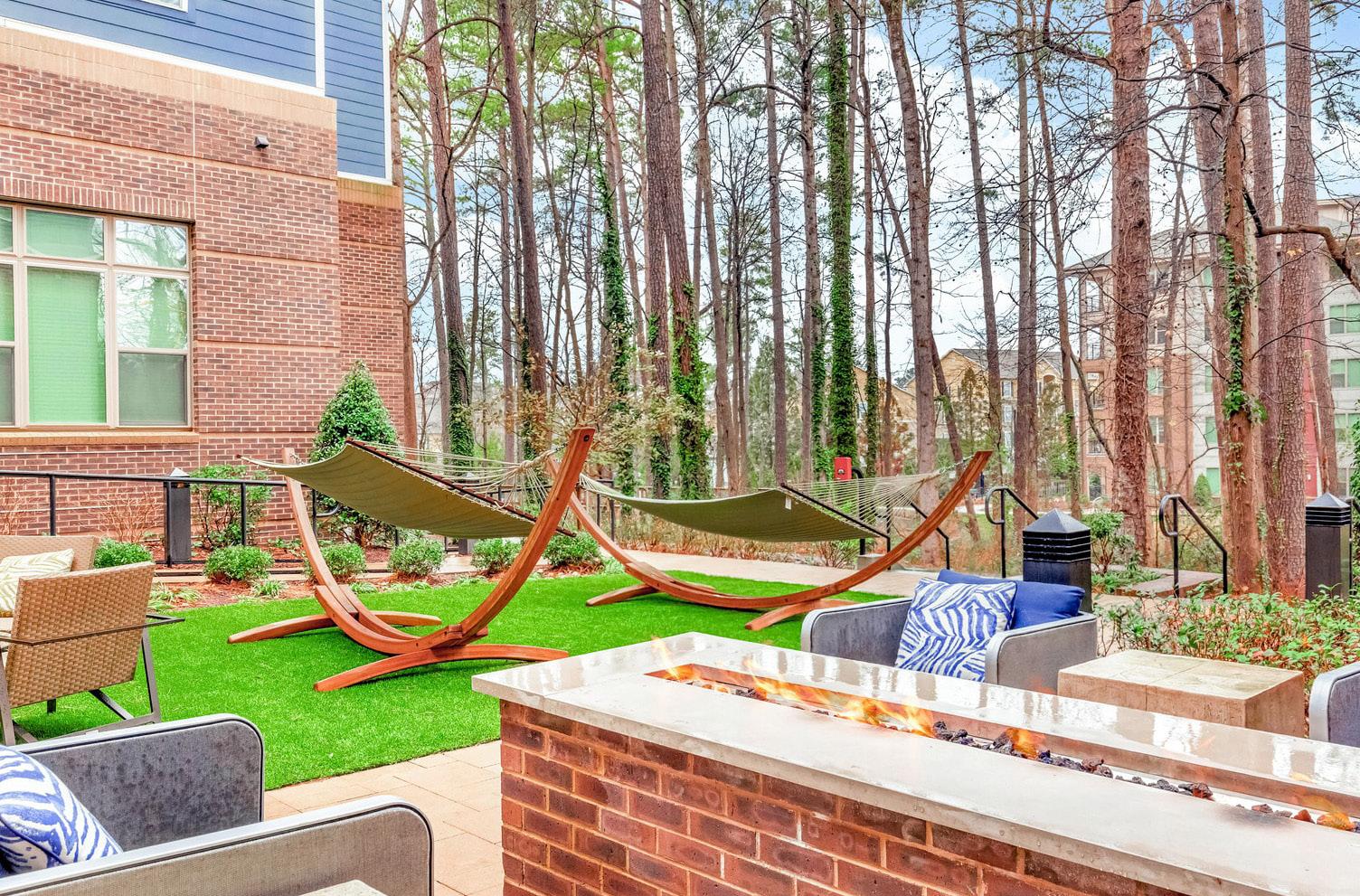
The Exchange on Erwin fits all your needs in one convenient location. Walkable to Duke University? Just steps away. Restaurants and shops at your doorstep? Definitely. Plenty of practical, modern amenities? You bet. Featuring THE FLATS, a brand new apartment community on Erwin Road, and The Market, with a plethora of boutique shops and restaurants, The Exchange on Erwin has everything you need to simplify your busy lifestyle.

Early Sunday, graduating students filed into Wallace Wade as scheduled for Duke’s Class of 2024 Commencement Ceremony. Attendees cheered on the graduates, many of whom did not have a traditional high school graduation due to the COVID-19 pandemic.
Yet, this would not be the only commencement ceremony occurring on Duke’s campus Sunday morning.
For many pro-Palestinian students, their graduation — although a monumental moment in their personal lives — was a platform to make their voice heard in addressing the “ongoing genocide” in Gaza.
After the graduates were all seated, the crowd saw four students silently get up and exit the stadium at around 10:06 a.m. The Commencement proceeded as usual, with a few more students leaving the stadium minutes later.
But at 10:35 a.m., President Vincent Price came to the podium to introduce this year’s commencement speaker, actor and comedian Jerry Seinfeld, which prompted about a hundred students to rise from their seats and leave the stadium amidst a sea of mixed boos and cheers.
“Jerry! Jerry!” some students and audience members cheered, with “Boo … Boo …,” “Disclose, divest — we will not stop, we will not rest” and “Free, free, free Palestine” also echoing in the stadium as Price continued to introduce Seinfeld.
Duke announced its plans to have Seinfeld deliver the commencement address in a video during halftime at the Duke-UNC game at Cameron Indoor Stadium March 9. Since the Oct. 7 attacks, Seinfeld has spoken of his experience as a Jewish person, saying that he has felt “very close to the struggle of being Jewish in the world.”
Seinfeld has drawn criticism for his public support of Israel, notably following a December visit to Tel Aviv, Israel where he met with the families of some of the hostages of the Oct. 7 attacks. His wife also recently sparked controversy for making a $5,000 contribution to a counterprotest of a pro-Palestinian encampment at the University of California, Los Angeles that turned violent.
Senior Skijler Hutson, one of the student organizers of the walk-out, wrote in a May 12 email to The Chronicle that the University’s decision to have Seinfeld speak at the ceremony “only solidified what has long been obvious: Duke University is more concerned with the interests of its donors than with taking action against genocide.”
“We’re excited and delighted for the Class of 2024 and their families,” wrote Frank Tramble, vice president of communications, marketing and public affairs, in a May 12 email to The Chronicle. “We understand the depth of feeling in our community, and as we have all year, we respect the right of everyone at Duke to express their views peacefully, without preventing graduates and their families from celebrating their achievement.”
Even though the Class of 2024 has faced challenges and losses, wrote Hutson and senior Shreya Joshi, another student organizer, in a May 11 email to The Chronicle, they felt an obligation to act as their class’ Commencement “takes place as the genocide of the Palestinian people enters its eighth bloody month.”
Senior Jen Gobaira said they decided to leave the stadium when Seinfeld began his speech by sharing how Price and the Board of Trustees brought him to speak because the students needed some “light entertainment.”
“I was like: Actually, that’s not what I need right now,” they said.

Others believed the walk-out would have “happened with any other speaker.”
Senior Zella Hanson, another student organizer and anti-Zionist Jew, said that in addition to the University’s decision to allow Seinfeld to speak at the Commencement Ceremony — despite him being “an avid supporter of the Israeli military … [that] is committing genocide in Gaza” — students also sought to protest the “scholasticide” and how “every university in Gaza has been destroyed.”
The student organizers distributed flyers in advance of Duke’s Commencement Ceremony to share the demands of the walk-out, which included calling on Duke to disclose its investments in Israel, divest from its holdings in companies “profiting from the occupation of Palestine,” boycott academic partnerships with universities in Israel and speak on an immediate cease-fire.
University administration declined to respond to The Chronicle’s request for comment on the student demands.
Some of the graduates who chose to participate in the walk-out also acknowledged the decision of the students who stayed at the official ceremony, sharing how they understand that they may have wanted to have a graduation after missing out on a high school ceremony.
However, others felt the focus should be on the conflict in Gaza, not their personal milestones.
“At the end of the day, me listening to part of this commencement or hosting an alternative one means nothing in the face of the fact that there are no commencements in Gaza,” Joshi said.
The graduates, accompanied by Duke faculty, family members and community members, marched to the Languages Building from Wallace Wade Stadium at around 11:07 a.m., waving Palestinian flags and chanting “From the river to the sea — Palestine will be free.” There, they continued to chant before conducting their own commencement ceremony with student speeches and the conferral of honorary degrees.
“Our rights of peaceful protest and free expression have continued to be under attack … Universities are trying to accuse us of being antisemitic,” said Jacob Ginn, a Jewish doctoral candidate at the University of North Carolina at Chapel Hill, in a speech during the alternative commencement ceremony.
Ginn added that he has “never experienced antisemitism in the movement for Palestinian
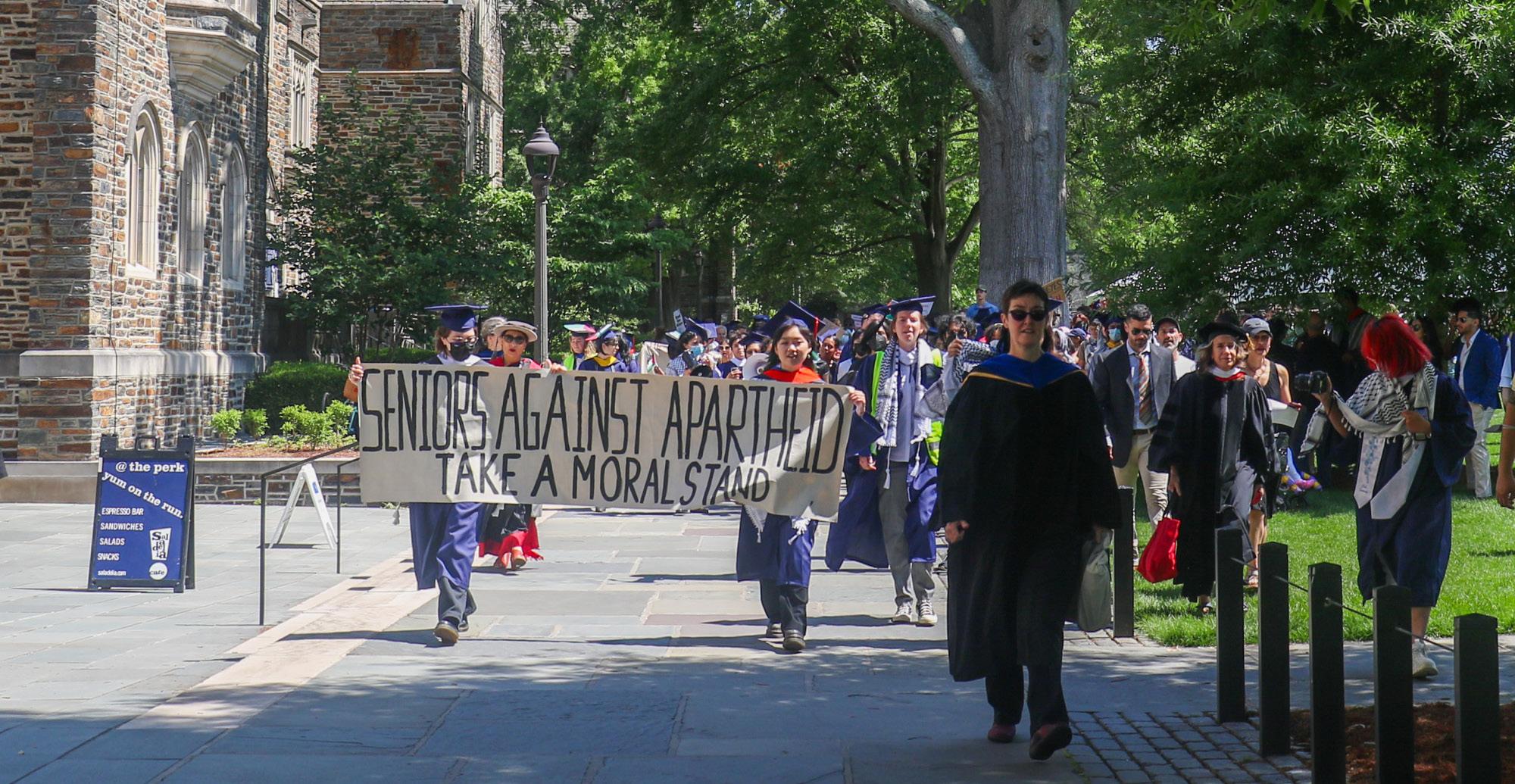
liberation,” and that “Universities do not have an antisemitism crisis, [but] a complicity in genocide crisis.”
“We felt like it would be a really powerful day of action to protest … what we see as an incredible injustice that none of those students [in Gaza] will be having that same privilege [of graduating],” Hanson added.
In his speech, Seinfeld also acknowledged the privilege associated with graduating from a university like Duke, advising the students in attendance to “use [that] privilege” and be proud of their education.
At around 11:23 a.m., the protesting graduates concluded their remarks in front of the Languages Building and redirected the student protesters to the Duke Chapel, as the bells rang their daily melody. The voices of the students similarly rang in chants — “Disclose, divest, we will not stop, we will not rest” and “Free, free, free Palestine” — as they held a banner reading “Seniors Against Apartheid; Take a Moral Stand” and wove Palestinian flags.
Student organizers shared their intention for the group to recreate the scene from the 1985 Commencement walk-out calling for Duke to divest from South Africa in response to its apartheid. That demonstration, in addition to other student-staged protests, led to the Board of Trustees’ May 4, 1986 decision to vote to sell its holdings.
“I hate to see Duke University on the wrong side of a great moral issue,” trustee Samuel Cook of New Orleans was quoted as telling the Board in the May 8, 1986 issue of The Chronicle. “The ultimate issue is moral, moral in the sense of the
vision of Duke University — what we are about.”
Members of the Class of 2024 expressed a similar goal to the Class of 1985 with regard to Duke’s holdings in Israel.
“A year after the 1985 Commencement protest … the Board of Trustees did vote to divest from South Africa. So ideally, here, that’s what we’re asking for to happen,” Joshi said.
She added that the demonstrators “were not interrupting” the speakers during the Commencement Ceremony and “didn’t chant anything when [they] left.”
The protesters’ presence at the Chapel drew the attention of other commencement-goers and their families who did not join the walk-out.
“Today, we graduate from an institution that professes to value contributions to the international community — free and open inquiry and a deep appreciation for ‘the range of human difference and potential. A sense of the obligations and rewards of citizenship and the commitment to learning freedom and truth,’” said a student speaker, as the demonstrators settled on the Chapel lawn. “This same institution is too cowardly to condemn an active genocide in Gaza, let alone cease from profiting from its contract with an apartheid state. Where is this commitment to learning freedom and truth?”
Adam Rosenblatt, associate professor of the practice of the international comparative studies program, wore a homemade t-shirt identifying
See WALK-OUT on Page 20
Tiffany Chen
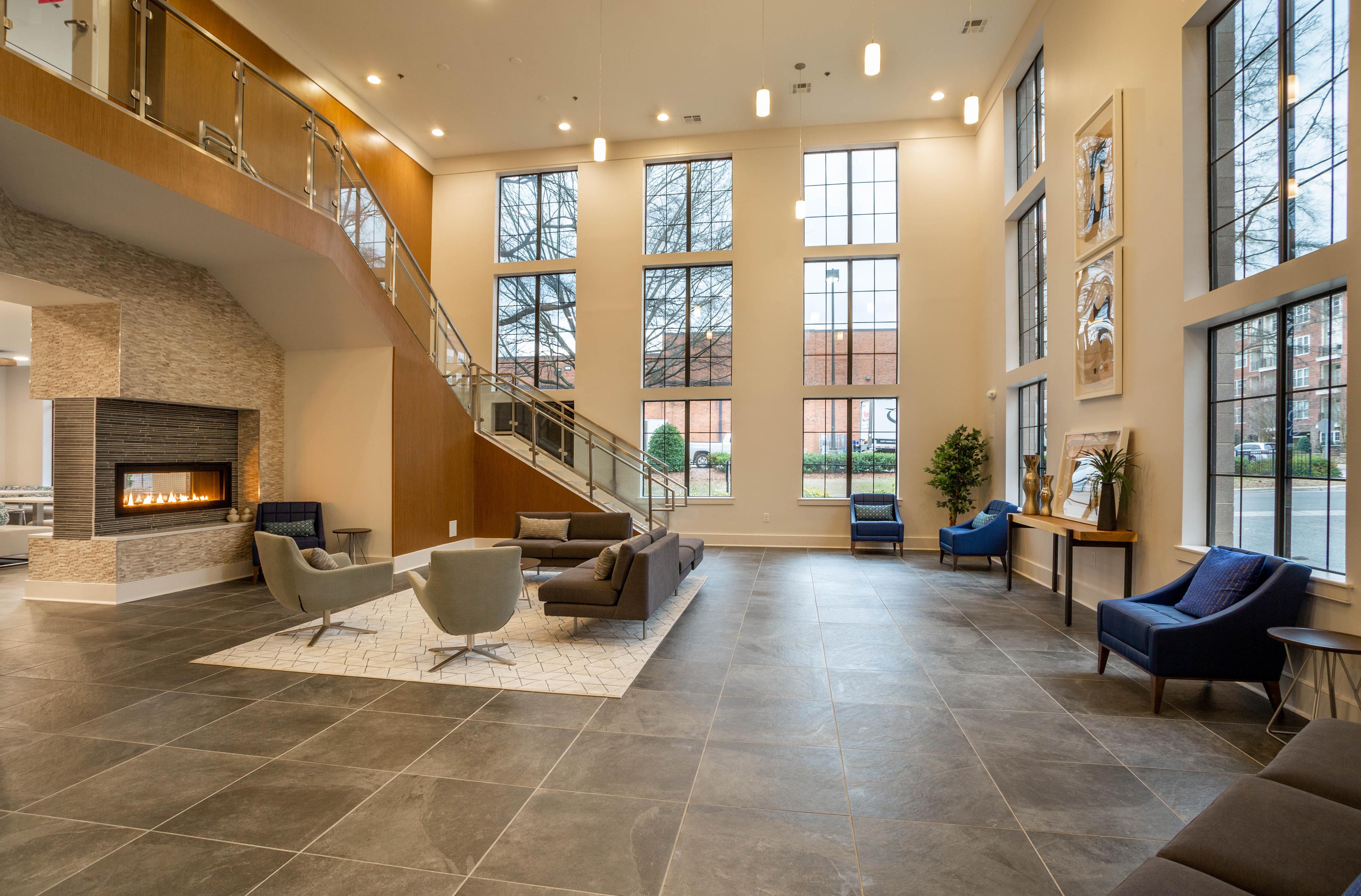

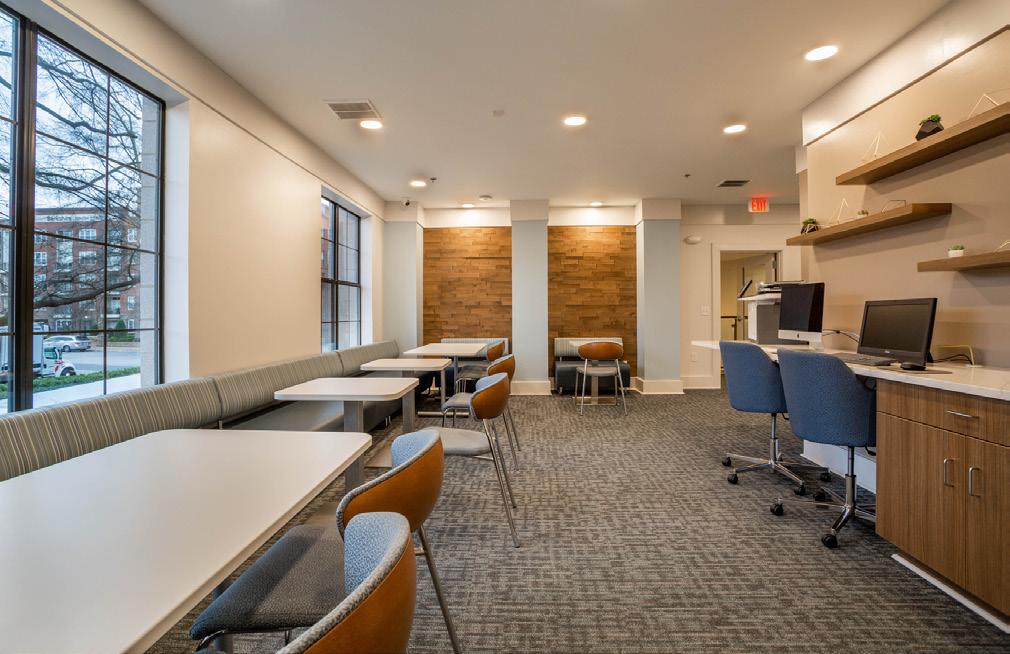
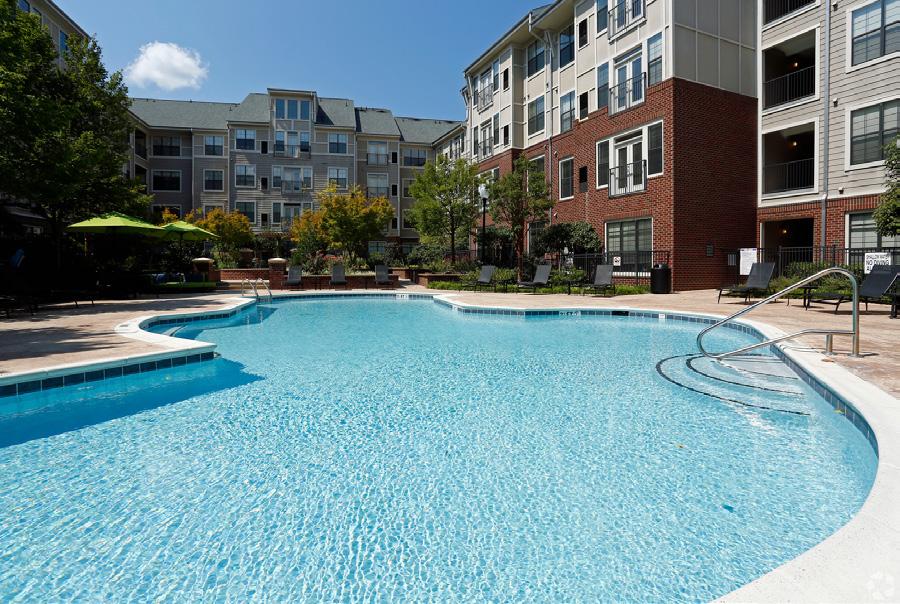
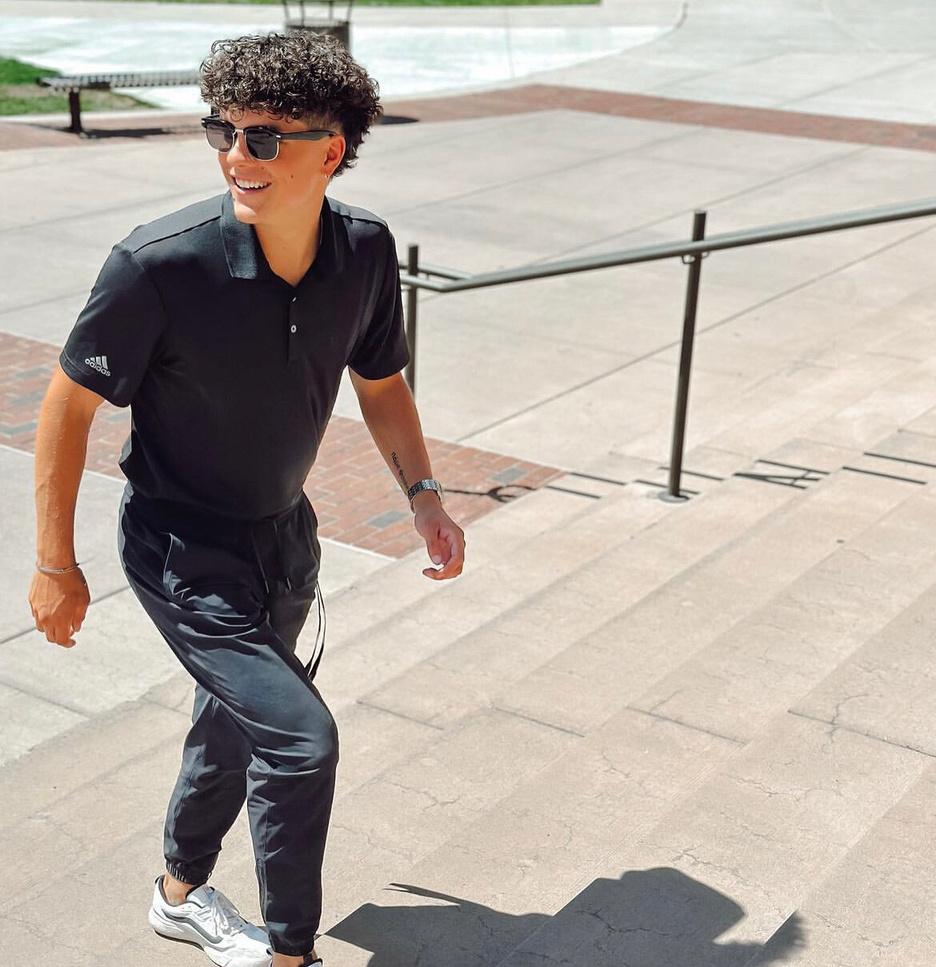

Over 60 Duke students joined tens of thousands of climate protesters in New York City, calling on President Joseph Biden and other world leaders to end their support of fossil fuels and declare a climate emergency.
Biden, who was set to speak before the United Nations General Assembly Tuesday, was criticized by attendees at the Sunday protest for continuing to approve oil and gas leases.
“He has the executive power to prevent future leasing within the Arctic, within the Gulf Coast, Texas, all of that … He just hasn’t been doing it,” said junior Abby Saks, co-president of the Duke Climate Coalition.
People vs. Fossil Fuels, a coalition of over 1,200 organizations working to end the use of fossil fuels for energy production in the U.S., organized the demonstration. The coalition demands that Biden ban federal fossil fuel leasing, including current onshore and offshore drilling, and stop the federal approval of all new fossil fuel projects and exports.
In a Wednesday press release, the Biden administration announced the creation of the American Climate Corps, which plans to train over 20,000 young Americans in “the growing fields of clean energy, conservation and climate resilience” within its first year.
“The power of our generation is insane, and I really do think that we are going to be the people to make change,” said sophomore Laila Dames, who attended the protest. “If anyone’s going to end fossil fuels and protect the earth, I really do think it’s going to be us in our generation.”
From North Carolina to New York Saks and junior Felicia Wang, DCC’s community partnerships coordinator, helped organize the trip from Durham to New York last weekend. They claimed that Duke students represented the
largest group of college students at the protest, with 56 students traveling to New York City on a DCC-chartered bus and 10 others joining via alternative transportation methods.
“Around half the people we took had never been to a march before, and around a third of them were freshmen,” Wang said. “Our goal really was to bring new people into the movement and serve as a catalyst to get people excited for more action in the future.”
The group left Duke early Saturday morning to arrive in New York City after a 10-hour bus ride. Some members of the group then

attended a panel of activists from other schools who addressed what Saks termed the “notorious burnout” faced by many climate activists.
Many students served as marshals in the event, guiding protesters through the march route and controlling the crowd. They participated in an 11:30 a.m. training on Sunday, then joined the larger group at 1 p.m. to begin marching.
The 1.3-mile route began at the intersection of West 56th Street and Broadway and wound through parts of Midtown, ending in front of the United Nations Headquarters. There, several
notable figures in the climate movement delivered speeches about ending fossil fuels reliance, including Reps. Alexandria Ocasio-Cortez and Jamaal Bowman and former president of Ireland Mary Robinson.
Over 70,000 people attended the protest, far exceeding organizers’ expectations of 10 to 20,000, according to Saks and Wang.
“The magnitude of this protest was insane,” Dames said. “It’s great to see youth coming together and speaking up and showing that we’re here, and we aren’t okay with what’s happening, and we want something done.”
The DCC-sponsored trip to Sunday’s protest was not funded by the University, and attempts to secure funding from the Student Organization Finance Committee for transportation and housing for the weekend were unsuccessful.
Saks and Wang instead turned to People vs. Fossil Fuels for assistance, with funds eventually donated by member organizations such as the Center for Biological Diversity.
The DCC not only wants to affect national change, but also change on campus. They hope to convince the Duke administration to divest from fossil fuels, which they claim contradicts the Duke Climate Commitment.
“For Duke, it’s been 11 years where we’ve been working to[ward] divestment, and it doesn’t seem like much has changed,” Saks said. “Even though it seems like nothing’s happening, if you keep on working towards it, you’ll get something in the end, at least that’s the hope.”
For senior Mira Polishook, attending protests are about “reinvigorating [her] passion for the environmental movement.
“Every time I attend a protest, it reminds me that I’m not the only one and that there’s a bigger movement that’s working toward combating climate change and ending the era of fossil fuels,” she said.
Duke is discontinuing its Reginaldo Howard Memorial Scholarship Program, a program for “top applicants of African descent,” in the wake of last year’s Supreme Court decision that ended race-based affirmative action in college admissions.
The announcement comes amidst a nascent national trend, with a number of public universities ending their own race-based scholarship programs in response to the Supreme Court ruling.
Established in 1979, the merit scholarship, which also required some recipients to demonstrate financial need, covered full tuition, room and board for a select group of Black undergraduates. The scholarship is named in honor of Reginaldo “Reggie” Howard, Duke’s first Black student government president who died in an automobile accident during his sophomore year in 1976.
“It is very much disheartening to hear that this program that opened the door for me to come to Duke is now being closed essentially, even though it will take on a new form,” junior Mya Harris said.
In place of the scholarship program, the Office of University Scholars and Fellows is partnering with the Mary Lou Williams Center for Black Culture to establish the Reginaldo Howard Leadership Program. The new program will be open to all undergraduate students, regardless of race, and will “not include a competitive selection process.”
“The Reginaldo Howard Leadership Program will honor Reggie Howard’s legacy by supporting Black academic excellence, intellectual community and leadership on campus through an intentionally designed series of engagement opportunities,” wrote Candis Watts Smith, vice provost for undergraduate education, in the Tuesday email to Reggie Scholars and alumni.
Reggie Scholars were informed of the plan to end the program in a Tuesday meeting. Scholars and alumni also
received a follow-up email summarizing the decision, clarifying it was “in light of changes to the legal landscape related to racebased considerations in higher education.”
Philanthropic funding previously allocated to the Reggie Scholarship will go toward the new leadership program along with need-based financial aid, according to the email.
The scholarship provided funding for other activities, such as independent research opportunities and domestic and international learning experiences. All current scholars will continue to receive funding, but no new merit scholarships will be awarded for the Class of 2028 and beyond.
Reggie Scholars said they were not involved in the decision to end the scholarship program.
“[Reginaldo Howard] was a very prominent figure in Duke’s history, period not Black Duke’s history, not Latino Duke’s history, just Duke’s history.”
“We were just kind of told what was happening as it was happening,” sophomore Hannah Gedion said. “We felt very powerless, to be honest with you.”
Historically, 15 to 20 Black students were selected as scholarship finalists per year upon admission to Duke, according to the Reginaldo Howard Scholars’ website, which has been taken down as of Tuesday evening but can be accessed through the Wayback Machine Internet Archive.
Finalists had to display a “commitment to academic achievement, leadership, and community service and social justice.” Scholarship recipients were then chosen from the group of finalists after an interview process, with no separate application required for consideration.
“I think the Reggie is a program that has given me a lot over the years,” senior Drew Greene said. “It’s given me not only a community, but a group of friends, a group of academic peers that I enjoy spending time with … It has been a fantastic experience, so of course in that regard, I am gutted.”
While some Reggie Scholars are disappointed, many expected the changes given the current admissions landscape and the Title IX complaint filed in September against Duke’s Alice M. Baldwin Scholars program, which alleged that the allfemale program engages in “reverse discrimination.”
“We’re all frustrated obviously, but we’ve been expecting it for a while, and kind of looking for next steps already,” Gedion said. “We’re trying to find ways to preserve Reggie’s legacy.”
In January, Duke’s Office of University Scholars and Fellows also announced a new timeline for its merit scholarship selection process. Under the “post-matriculation” model, scholarship recipients will be notified about their award, which is awarded partly on the basis of financial need, after enrolling at Duke, rather than before.
Amid the changes, Reggie Scholars hope to continue carrying out the legacy of their namesake.
“We just want to make sure that Reginaldo Howard stays in the conversation in any way, shape or form that we can because he was a very prominent figure in Duke’s history, period — not Black Duke’s history, not Latino Duke’s history, just Duke’s history,” Gedion said.
though we do not wholly believe it yet, the interior life is a real life, and the intangible dreams of people have a tangible effect on the world.
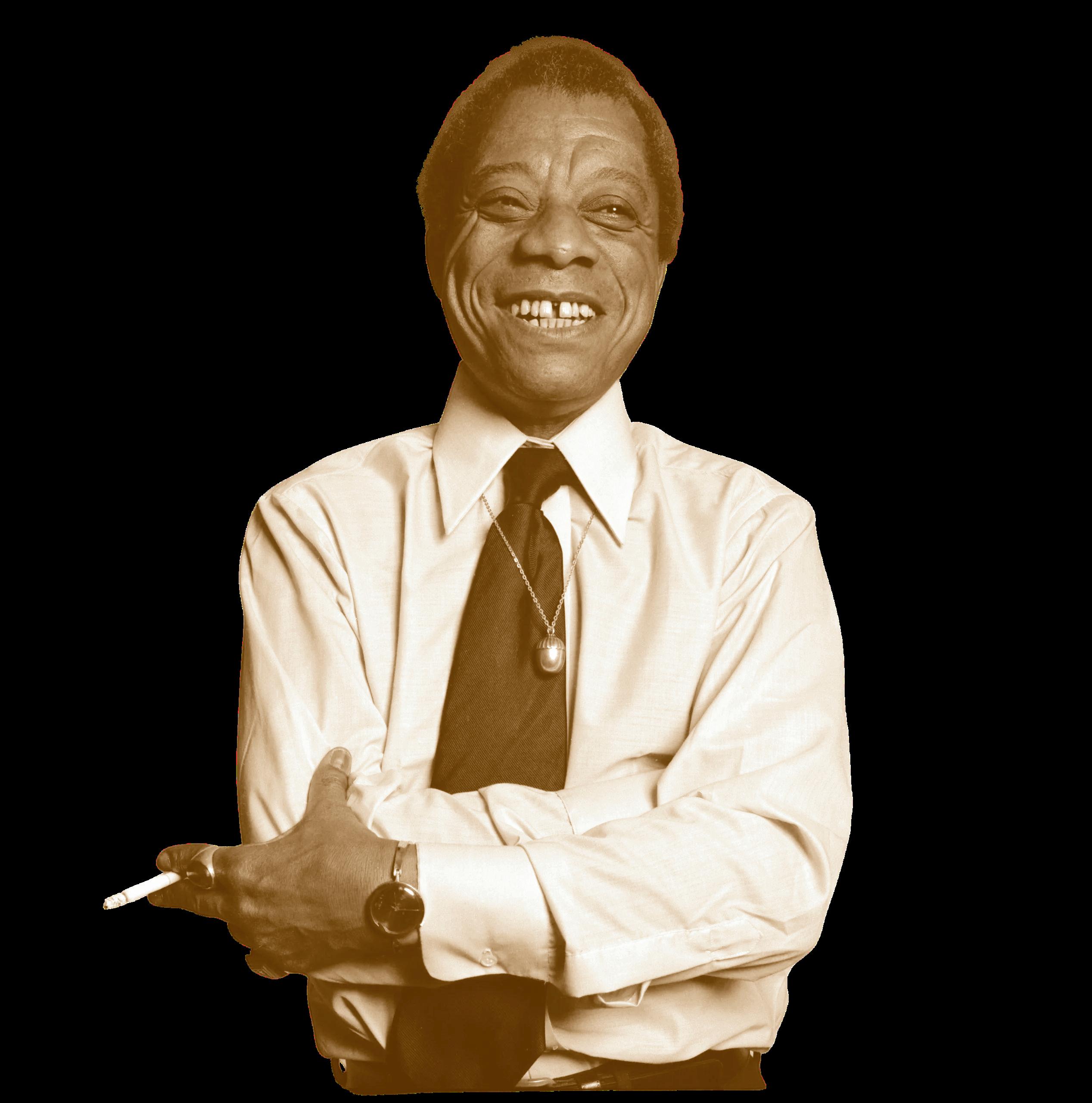 JAMES BALDWIN
JAMES BALDWIN
Say the Thing

FROM PAGE 3
because I need a place that values and fosters both the philosophy and the science.”
The next video subject and stage guest was Shree Bose, School of Medicine ‘23. While she is currently pursuing her medical residency at the University of Chicago, Bose claimed that Duke remains a large part of her identity.
“Duke is where you grow up,” she said. “It’s where you find your best friends. It’s where you find your mentors. It’s where you figure out what matters to you, what really makes you who you are.”
Another video then recounted the journey of director of residential dining Barbara Stokes, who first came to Duke as an undergraduate student and held a work-study job as an egg cook. Stokes spoke to the crowd about developing her employees personally and professionally by listening to and understanding their “concerns and needs.”
The final video featured the Sinnamon Family, whose two-year-old son Easton was the first person to receive a combination heart transplant and allogeneic processed thymus tissue implantation. The video chronicled how Joseph Turek, chief of pediatric cardiac surgery and Mary Louise Markert, professor emeritus of pediatrics, collaborated to pioneer the historic operation at Duke University Hospital.
Following a brief choir and dance performance, the Sinnamon family was brought out to a standing ovation. Jeong then brought out President Vincent Price, who said he was “incredibly moved” by the speakers before him.
“Our Centennial is a gift to us,” he said. “It’s a chance to pause and reflect on our past. It’s an opportunity to appreciate the present and to plan for the future.”
Krzyzewski, the final speaker, spoke about the values that embody Duke, telling a story about a play made by former Duke men’s basketball player Grayson Allen in the 2015 men’s basketball championship game. Krzyzewski described how, despite being the eighth player on the roster, Allen had the courage to dive for a loose ball and draw a foul in front of millions of people. Allen then screamed “Let’s go!”, which shifted the momentum to favor Duke and helped secure the team’s most recent national championship.
“No one knew that we were going to be as good as we were,” Krzyzewski said. “The thing is, they have no clue about how much better we’re going to be.”
As the event came to a close, the featured performers and speakers returned to the court, accompanied by the cheerleading team and the Dancing Devils. Blue and white balloons fell from overhead as the audience members danced and sang along to “Everytime We Touch.”
Duke will be hosting a variety of centennial events throughout the year, the next being a commemoration of civil rights leader Martin Luther King Jr. The event, hosted by the Office of Institutional Equity, will take place on Jan. 14 at 4 p.m. in the Duke Chapel.
FROM PAGE 3
including Duke students, can be good neighbors and live in harmony.”
Spring semester crackdowns
Multiple fraternities, including Durham chapters of Alpha Delta Phi, Alpha Epsilon Pi, Sigma Chi and Pi Kappa Phi and all-male selective living group Wayne Manor had noise complaints issued on their addresses, according
to Durham Police Department records over two weeks in January.
These complaints resulted in a series of knocks on doors telling students to leave and a handful of arrests by police.
Police reports on fraternity houses indicate that the number of calls by concerned neighbors has disproportionately increased for some fraternities since August 2023.
Affiliated members shared details about two of the earliest incidents on the night of Jan. 18 and early morning of Jan. 19. The Chronicle obtained the arrest records of a member of the Durham chapter of Alpha Epsilon Pi’s executive board, who was cited after students were found on the roof and allegedly created a fire hazard. Over forty Sigma Chi brothers and rushing students were lined up outside, breathalyzed, asked for identification and cited with underage drinking or supplying alcohol to minors.
All of these students subsequently had their charges dropped in the following weeks, though Sigma Chi has since stopped holding parties at the residence where the events of that night took place.
Alpha Epsilon Pi and Sigma Chi’s presidents did not respond to requests for comment on that night’s events, nor did the Durham Interfraternity Council.
First-year Ben Maschler, who accepted a bid for Alpha Epsilon Pi, commented on the night’s events and the brothers’ responses to it.
“With the frat that I’m pledging, it’s just been noise complaints,” Maschler said. “The brothers are pretty good about dealing with the police and making sure that nothing ever gets too out of hand.”
Student responses
Other affiliated students were more concerned about the uptick in police presence and its implications for students.
“Quite a few guys in frats potentially have charges, which is terrifying,” said sophomore Kaitlyn Williams, a Durham Panhellenic sorority sister.
According to Williams, multiple first-years she knows were scared to accept bids to the fraternities that were most affected by police activity. These first-years declined to interview.
The anonymous sister added that people of color may have been nervous about taking bids in fraternities and sororities, due to biases in the justice system that may adversely affect them if they are arrested.
“I heard comments, especially with friends of color being a little nervous about the different ways that this would impact us in comparison to some of our white counterparts,” Williams agreed. “I think there’s already a very small portion of minorities within frats and sororities, and [the police presence] aren’t an appealing addition to push you to rush.”
However, other students are not worried and believe that potential police interactions will not have serious consequences.
“I think it’s a temporary scare for most people, and I think that Greek life is really clouded with privilege. A lot of people that have grown up in so much privilege, like, they kind of know they don’t have to worry about the repercussions, which is really upsetting. I feel like [the police] are gonna be a joke,” the anonymous sister said.
Maschler thinks that the fear of potential arrest will not disincentivize students from rushing or attending Greek events.
“There’s a very strong incentive, especially for freshmen and sophomores, to go to fraternities to let loose a little bit. I don’t know if the police are enough of a deterrent,” Maschler said.
Duke-surrounding neighborhood communications
These students were unsure of the cause of the crackdown, but some pointed to a new program which better connects Duke to its surrounding neighborhoods.

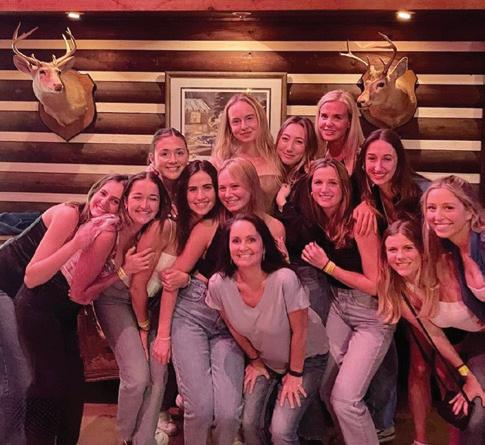


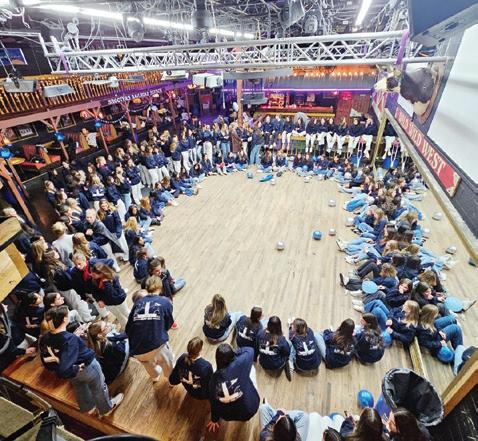


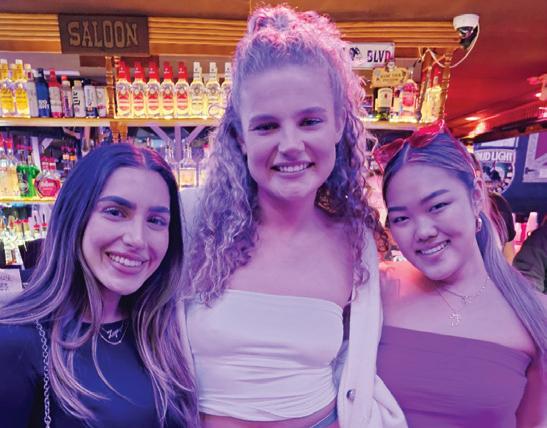



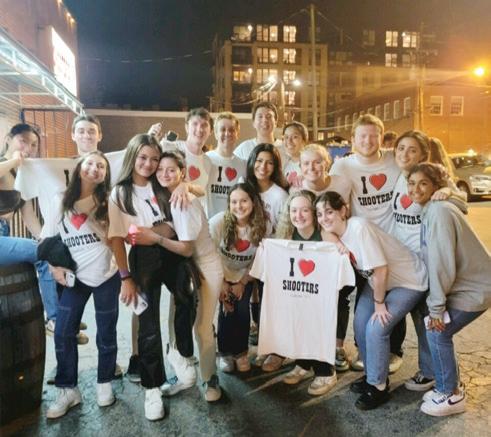
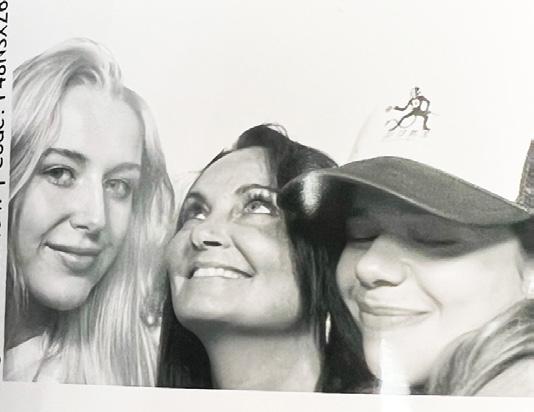

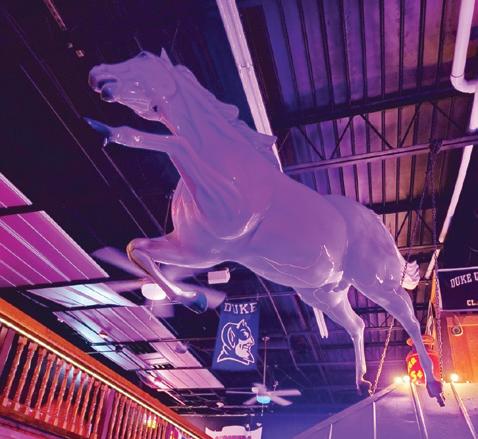

The Duke Student Affairs launched the Good Neighbor Program in fall 2023. The program aimed to improve communications between University administration, students living off campus and partnered neighborhoods where many fraternity houses are located.
“The program communicates directly with Durham residents who live close to our students. We want our neighbors to know they can reach out with any questions they have, and the university maintains the same expectations for our students living off campus as we do for those living on campus,” Landess said. “The Duke Good Neighbor Program and our messaging focuses on the neighborhoods where most of our students live.”
The program aims to “cast a broad net with communications” to reach all students, including those in Greek organizations, Landess noted.
The messaging from the Good Neighbor Program coincides with an increase in noise complaints about fraternity houses since the start of the spring semester, as well as the increase in arrests.
“We just further perpetuate the stereotype of being poor neighbors to the Durham community. I think there’s always been this kind of belief that Duke students think they’re better than Durham,” Williams said.
“Us existing [in] residential neighborhoods right next to families who are trying to go to bed at 11 p.m. on a Thursday doesn’t help with that image whatsoever. I think it creates this weird perception that Durham is just a playground for Duke students to use,” she continued.
Multiple students felt, though, that this poor image is rooted in the disaffiliation of Greek organizations from the university, which forced them off campus into residential neighborhoods.
“Greek life is a pretty f***ed up system. But when it got pushed off campus now it’s Durham’s responsibility … It’s worse for the residents of Durham and pushes the idea that Duke students are
privileged, loud partyers and don’t have any respect,” the anonymous source said. “Parties are going to happen regardless. So just pushing them off campus and letting kids get citations is fascinating.”
FROM PAGE 3
But to the staff, this is a sudden decision — and two to three years simply isn’t enough time to relocate 825,000 dried plant specimens that Duke has housed for over a century now.
“The international community is stunned. My email has … just been rocketing. Emails of, ‘This can’t be true,’ ‘This can’t be, because so many people rely on this collection.’ Its collections are priceless. And we’re just going to, what, ship them off? It’s not something you just unload on somebody,” Pryer said.
The decision was also made when all five professors were on the verge of retiring. For Pryer, “[closing the herbarium] is not going to just take away a resource, it’s going to kill a program.”
FROM PAGE 11
“As an institution of higher learning, we value wide freedom of expression for those in our campus community. With that freedom comes the responsibility to foster scholarly discourse, and not descend into polemics, personal attacks or antisemitic or anti-Muslim rhetoric,” Price wrote in the Monday statement.
This is not the first time phrases have been removed from the bridge. In October 2021, homophobic and anti-Black graffiti was found on the bridge, which the Division of Student Affairs and Duke Facilities “immediately” worked to remove.
In February 2020, a red swastika was found painted on the bridge, but was quickly painted over. It wasn’t clear who had removed the symbol.
Another swastika was found on the bridge in November 2018. Price pledged afterwards to install a security camera at the bridge, which was used in an attempt to catch the painter of the swastika in 2020.
In November 2021, the Foundation for Individual Rights in Education, a non-profit civil liberties group focused on protecting free speech rights on college campuses, sent a letter to Price arguing that “investigation into painted content and the use of surveillance cameras to monitor the bridge threaten the ability of students to exercise their right to engage in anonymous expression.”
FROM PAGE 15
himself as a Jewish professor in support of the “free Palestine” movement.
He shared his admiration for the students who decided to “take a day which they really have a right to make about them” to join together to hold the University accountable “to its highest purpose of being a space of dialogue [to address the Palestinian] struggle for liberation.”
“I also want to point out for the people who might have not been there that it was also a really joyful community,” Rosenblatt said. “There was really a celebratory element of students showing up for each other and honoring each others’ beliefs.”
Although students have not hosted an encampment on Duke’s campus, Rosenblatt emphasized that the University’s student body should not be “misrepresented” as not being engaged in the protests and that these protests are not isolated, but a part of a collective national movement.
Amidst rising tensions on college campuses across the country, several schools elected to cancel
their commencement ceremonies altogether citing “security concerns.” Columbia University canceled its main commencement ceremonies May 6, while Emory University decided to move the event off campus the same day.
The University of Southern California also canceled its primary commencement ceremony in favor of individual school events. The move came after university administration announced that it would not allow its student commencement speaker, valedictorian Asna Tabassum, to make her speech following complaints from a number of pro-Israel organizations that she “[promoted] antisemitic views,” citing reposted content from accounts that called for the “abolition of Israel.”
Joshi and Hutson wrote in the May 11 email that “dominant narratives pin the blame for national losses of commencements on students acting in protest of genocide, rather than institutional repression.”
Gobaira shared that if they had more time at Duke, they would want to go into the University archives to piece together the timeline of student activism. They added that Duke tends to “tout” the 1969 Allen Building Takeover as the pillar of activism culture, and that students need a “history of activism that [they] can relate to” in order to inspire a greater activism culture on campus.
After concluding their chants, the graduates posed for a photo outside of the Chapel meant to resemble the scene from 1985. They then moved their tassels from the right to the left, throwing their caps in the air in celebration of their commencement.
“This was the greatest point of political leverage that [we] might have in the next few years,” Hanson said of the demonstration. “I hope that the tassels turn inside Wallace Wade Stadium was worth it, because I think what we did today was really important and joyful — and hopefully made a difference.”
Ryan Kilgallen contributed reporting.

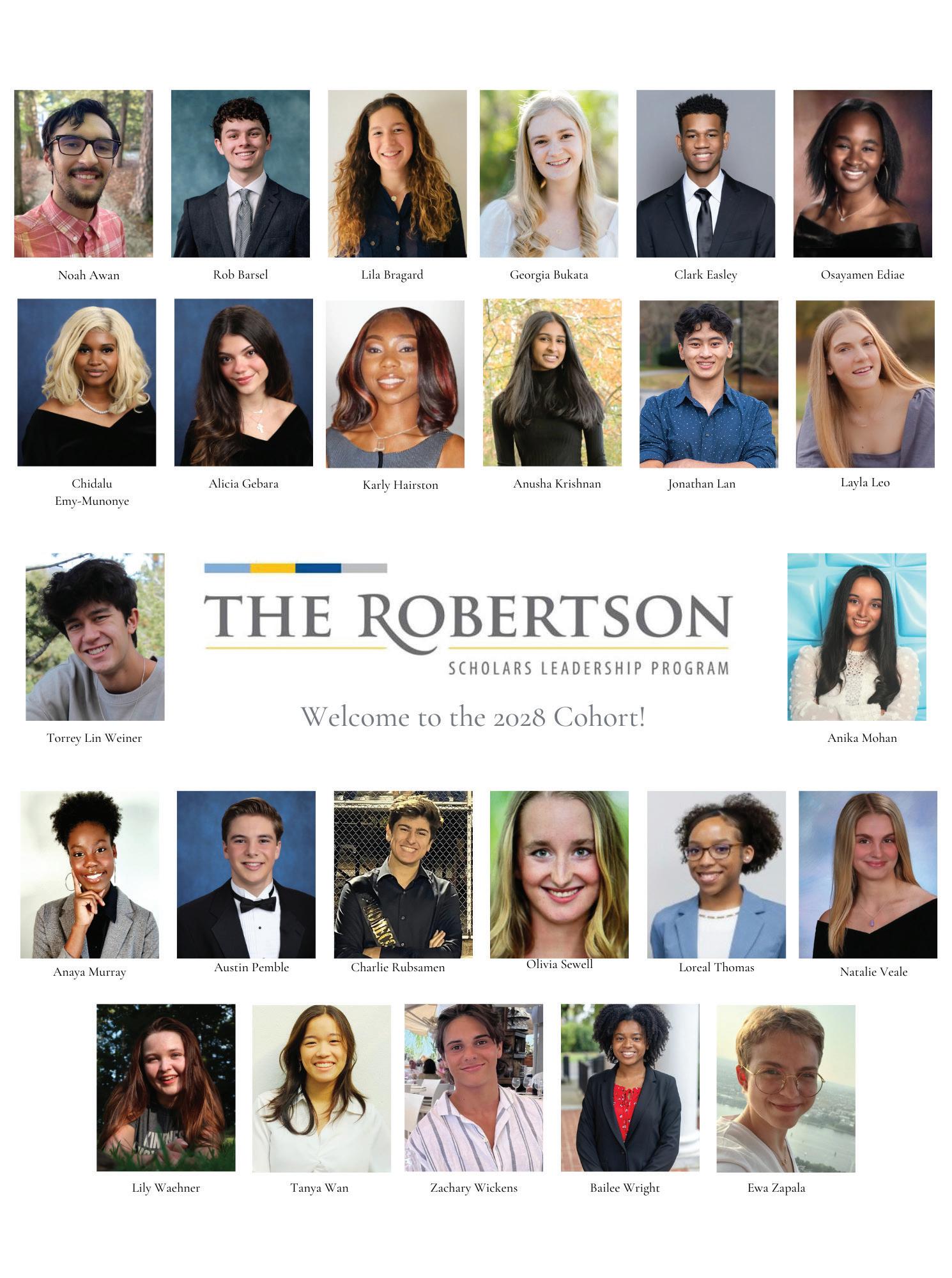

You don’t have to be a helicopter mom, Duke. You can let us go.
A mother is sending off her first born to Duke. It’s freshmen move-in day, and all the helicopter moms have said their final goodbyes — all but her of course. The family of three stand in front of the chapel, the sun has now set. Her husband tries to pull her way, and her son is itching to get to his first Shooters pre-game (where only water will be served, of course). She grabs hold of her child; promises to never let go; tears flow uncontrollably.
Now, to clarify, this story is not about me. After all, when my parents dropped me off, not only did they not cry, they celebrated for the next month.
You take him, Duke!” “Sayonara Alex!”
Now back to the story.
But out of the darkness, a mysterious yet impressive figure emerges. It is President Price. He gently grasps the mother’s shoulders, and tells her but one line.
“It is okay to let go.”
Miraculously, she releases hold of her child.
As the boy begins walking to catch the C1, he cannot help but smile. Finally, he may lead a life of complete liberation.
Then, like out of a nightmare, the Duke housing officers and the Global Education Office (GEO) staff appear suddenly out of the
The Chronicle welcomes submissions in the form of letters to the editor or guest columns. Submissions must include the author’s name, signature, department or class, and for purposes of identification, phone number and local address. Letters should not exceed 325 words; contact the editorial department for information regarding guest columns.
The Chronicle will not publish anonymous or form letters or letters that are promotional in nature. The Chronicle reserves the right to edit letters and guest columns for length, clarity and style and the right to withhold letters based on the discretion of the editorial page editor.
bushes. President Price — their leader — walks in front of them. He stares at the student and says but one word.
“Gotchaaa!”
Price and now an entire ensemble of Duke bureaucratic workers begin pointing and laughing uncontrollably at the boy. Dejected and, quite frankly, a little bit terrified, he walks onto the C1, completely defeated.
After 18 years of having had his mother breathe down his neck, the boy finally thought he would be set free.
Sadly, he was mistaken.
First, I must preface that Duke is an incredible place where the students enjoy a multitude of freedoms. Nonetheless, the university insists on holding — or better yet, guiding — our hands each step of the way. And for this reason, I say to President Price what he had told the mother in this story.
“It is okay to let go.”
In rhetoric, sure, the Duke administration has expressed the greatest trust in their student body, composed of some of the brightest young minds in the world. However, their insistence on intervening in the lives of its students suggests the opposite — that Duke has little to no trust in us at all. And although I have only attended this university for 1.5 years, it truly feels like each semester, Duke introduces a new reform to cap the autonomy of its students. Most recently, this was a dramatic change to Duke’s study abroad program.
Direct submissions to: E-mail: chronicleletters@duke.edu
Editorial Page Department
The Chronicle Box 90858, Durham, NC 27708
Editor-in-Chief: Abby Spiller
Sports Editor: Ranjan Jindal
Managing Editor: Michael Austin
News Editor: Zoe Kolenovsky
Photography Editors: Morgan Chu, Karen Xu
Opinion Editor: Alice Qin
Recess Editor: Zev van Zanten
Enterprise Editors: Jothi Gupta, Zoe Spicer
Senior Editors: Holly Keegan, Ishita Vaid
Editors at Large: Andrew Bae and Michelle Brown
Features Managing Editor: Claire Cranford
University News Editors: Kate Haver, Lucas Lin
Centennial/Elections Editor: Jazper Lu
Health/Science Editor: Winston Qian
Local/National News Editor: Samanyu Gangappa
Associate News Editors: Ana Despa, Aseel Ibrahim, Ryan Kilgallen, Ava Littman, Madera Longstreet-Lipson, Halle Vazquez, Michelle Voicu
Sports Managing Editors: Sophie Levenson, Dom Fenoglio
Data Editor: Audrey Wang
Diversity, Equity, and Inclusion Coordinators: Michael Austin, Zoe Kolenovsky, Abby Spiller
Recruitment/Social Chair: Andrew Long
General Manager: Chrissy Beck
Advertising Manager: Megan Haven
Creative Manager: Julie Moore
The Chronicle is published by the Duke Student Publishing Company, Inc., a non-profit corporation independent of Duke University. The opinions expressed in this newspaper are not necessarily those of Duke University, its students, faculty, staff, administration or trustees. Columns, letters and cartoons represent the views of the authors.
To reach the editorial or business staff, you can find contact information on dukechronicle.com. To reach the Advertising / Business Office at 1517 Hull Avenue call 919-684-3811. @ 2024 Duke Student Publishing Company
In the first weeks of November, if a blind visitor were to have conversations with the sophomore student body, they likely would leave having no idea that it was peak midterm season. They would, however, be able to articulate — in great detail — all of the new rule changes to Duke’s study abroad program and explain precisely how we were all being “screwed over.”
For the readers who do not know, prior to this year, students could study at any of the Duke-in or Duke-approved programs for their semester abroad. However, due to an “overabundance” of students in Madrid, Florence and Copenhagen these past few years, Duke’s Global Education Office (GEO) made the decision to set 50-person caps on all programs. Those programs that surpassed 50 sign-ups would be sent to a lottery, where from there, it became random luck as to whether or not you were accepted.
Yes, it is true that this new initiative greatly limits the opportunity for STEM and Engineering students to study at a program of their choosing. But, there is a greater issue at hand, one that has become synonymous with Duke’s administration.
A semester abroad is often described as the best few months of college, and for many, the best of their lives. Yet on multiple occasions in preparation for program sign ups, the GEO stuaff articulated their intent to separate large collectives of friends from sticking together. And to this, I ask plain and simple:
How does this concern you and why are you so invested in the path we take?
If a student chooses to embark on a solo expedition to Tanzania or Ecuador and comes back with an enlightened world view, this should be celebrated. But in the same way, if one prefers an experience of partying in Madrid and traversing through Europe’s great cities, that should also be welcomed. As someone who favors the former option (of non-European travel), I am still able to acknowledge that not everything needs to be about “personal growth.” In the end, we are still just kids, who should not only be allowed to but encouraged to maximize the amount of fun we have. Thus, it is entirely understandable that students want to experience this time alongside their closest friends … all of them. However, because Duke assumes that they know precisely what’s best for our development, many students will be deprived of this.
Still, undoubtedly the greatest change to Duke life has been the evolution of Duke housing as an effort to consolidate control over the students’ living arrangements. Some of the major reforms have included the dissolution of Central Campus, the switch to random roommates for all freshmen and enforcing on-campus housing for the first three years of schooling.
“QuadEX,” which sees that the students of two paired East Campus dorms live together in the same “quad” on West, was simply the most recent reform. The goal is to establish strong social communities ingrained within our student body — think Hogwarts minus the magic, fun and actual formation of social communities. In addition, by obliging that people from the same freshman dorm stay together sophomore year, this will, in theory, facilitate the continuation of friendships. This is where the fallacy lies.
Yes, I have certainly noticed many friendships blossom out of my freshman year dorm, but that strong community likely would have formed with or without QuadEX and its two to three sponsored social events a year. The issue is that when we move to West Campus, these communities largely dissipate due to the large size and complex structural organization of the quad buildings. Take the comparison between Southgate and Few. Southgate is three floors, with living quarters concentrated on the top two, and each consisting of one central hallway. There is only one common room in the entire building. Then there is Few, composed of three distinct houses, six floors (with two common rooms on each floor) and a countless number of hallways. The place is an absolute maze. Put simply, people in the same quad do not see each other nearly as often as they did in their freshman year dorm.
So let’s say it how it is. This isn’t the Brady Bunch; Duke, and West Campus Quads are not a place where we all sing in harmony. If someone meets their best friend in their freshman year dorm, they should be able to live with them as a sophomore. But in the same way, if someone wants to room with a person from an entirely different freshman dorm, let them.
Quite frankly, I am not sure why Duke feels it must intervene in the natural development of friendships. The only thing I can think of is that they simply deem us incapable of forming relationships organically. Perhaps, what they say about nerds is true. We simply don’t know how to talk to people.
Ehhh, I don’t think so.
At face value, the reforms that have been described in this article will not greatly impact my college experience. I still have an incredible roommate as a sophomore and will likely still have an amazing time during my semester abroad. But what I and many of my classmates would appreciate is the opportunity to make our own choices. I mean, for God’s sake, you took away Nutella! What sick person deprives a populace from Nutella. If a person allergic to tree nuts is smart enough to get into Duke, they are also likely smart enough to know not to eat Nutella. And I can say that as someone who embarrassingly admits to having a peanut allergy (how pathetic, right?).
So, all I ask from Duke is to have just a little more faith in your student body. Although we may do some idiotic and outright insane things sometimes, we generally have an understanding of who we are and what works best for us.
You don’t have to be a helicopter mom, Duke. You can let us go.
Aaron Siegle (T’26)
Feb. 23
Merely a scent of the noxious odor emanating from Abele Quad was enough to drive me back into the library. From the safety of the great indoors, I was able to watch the Dust-Bowl-era scene unfolding on the other side of the glass. Clouds of dirt billowed from the barren soil, concealing the azure blue sky above. A column of tractors spewed tiny pellets of synthetic fertilizer across the parched earth, which then helplessly flew away with the next gust of wind. Such hardships must be necessary to prepare for the day when the verdant strips of turf will magically form a pristine lawn, right?
The remodeling of Abele Quad generates the usual inconveniences associated with any construction project. Ironically, the most damaging aspect of the project is its objective — to make campus more “green.” Ever since Carolina Green Athletic Field Constructionrolled out bales of artificial turf across the heart of Duke’s campus, the lawn has looked stunning. But beneath its glamorous appearance, the grass harbors ecological and social malaise.
Sometimes the grass is greener on the other side because it’s fake. Duke’s landscaping decision is a form of values signaling that impacts the thoughts, identity and appearance of those who tread on it.
Lawns are America’s most irrigated “crop.” Given that the city of Durham almost cut off Duke’s water supply during a drought in 2007, the amount of lawn on campus is problematic. Duke’s Climate Action Plan identifies emissions from fertilizer as a significant source of the university’s emissions. Lawns function as an ecological trap, attracting fauna such as insects only to kill them off due to a lack of habitat. Additionally, a lawnmower running for a mere hour emits the same amount of harmful volatile organic compounds (VOCs) as a car traveling 400 miles. And don’t forget that lawnmowers expel a disproportionate amount of tropospheric ozone and noise pollution relative to their size.
Although these realities may be concerning, they don’t explain how lawns shape us and our identity.
To answer this question, let’s take a brief journey through the history of lawns in Western society. Lawns began as a sign of feudal power in medieval Europe while also serving the practical purpose of making it easier to spot approaching enemies. It wasn’t until the mid-20th century and the rise of suburbia when common folk could afford to maintain their own lawn. Policies of racial segregation in the lush suburbs made lawns a symbol of white superiority, according to civil rights icon John Lewis.
In other words, rolling out the green carpets isn’t just bad for the environment, it flies in the face of the university’s goals to make Duke a more inclusive place.
“Lawns are symbolic of our lack of thought,” read a sign that appeared soon after the fresh turf was plopped into place on Abele Quad. It is appropriate that the sign was a part of 11th Organ, a Duke Arts program centered around innovative art forms.
From an academic perspective, this maxim couldn’t be truer. A typical day in the life of a Duke student involves copying and pasting code from the internet, memorizing all 20 amino acids or calculating the deadweight loss of a market inefficiency. While all these skills may be professionally valuable, they don’t take that much creativity or original thinking. Our limited curiosity is exhibited by the decline of humanities at Duke and across the nation. In a way, our thoughts mirror the grass we gaze upon — both are uniform, facile and repetitive.
The grass also mirrors our own fakeness, our attempt to live up to expectations that we are not designed to meet. Think about it. Biologically speaking, grass isn’t supposed to be bright green in the middle of winter, even in North Carolina. But because of our preconceived notions of grass as evergreen, Duke replaced real grass with fake grass to satisfy our expectations. In the same way, we attempt to project an image of ourselves as an overachiever, a pathbreaking innovator — someone who never fails. But this masks our true selves, people ridden with struggles, shortcomings and uncertainty.
We crave a landscape that matches the superficiality of our existence. In many ways, this shallowness is predictable, driven by market forces. Social media feeds prioritize posts that reinforce stereotypical archetypes because they know this content will generate more engagements. Students tailor their resumes and thus their lives to fit the specifications of large corporations. In other words, creativity may get you into Duke, but conformity helps you succeed at Duke. We came into Duke as wildflowers but then realized that being grass is easier and ultimately more lucrative.
I understand that Duke will never get rid of all its lawn. But there are practical solutions that can lessen the environmental and cultural burden lawn places on the community. Pocket prairies are biodiversityrich patches of native grasses planted in urban areas. Replacing sections of the Abele Quad turf with pocket prairies will enhance habitat as well as add diversity to the otherwise dull landscape. Perhaps more importantly, these patches of native grasses, with their intricate stems and distinctive flowers, will demonstrate to visitors and students alike that Duke values a variety of ideas. Already, universities across America such as Marquette and Oklahoma State have livened up their campuses with real nature.
Changing our campus culture will take a more grassroots (no pun intended) effort. But I am hopeful that students can take cues from nature and pursue interests merely for their intrinsic value.
Grass oversimplifies the beauty that nature has to offer. Let’s make sure that the lawns of life don’t dim the magnificence of our human nature.
In the last 16 days, I’ve started college and my brother has been in two lockdowns
In the last 16 days, I have called my brother to ensure he hasn’t been shot. Twice.
I go to Duke and my brother goes to the University of North Carolina at Chapel Hill. Rivalry aside, I have always felt strongly affiliated with the UNC community. That being said, this community of students that I adore — my family and best friends — have become victims to not one, but two threats of gun violence in the past three weeks. The first display of violence left a faculty member dead. The second, occurring only hours ago, reaffirms one vital message I urge you to consider: gun violence has waged war on our neighbors and it is time to stand in solidarity with our UNC family to fight for gun reform.
It was Aug. 28, and I was making my trek to statistics with an unbridled excitement brewing in me. This day marked the event I had eagerly anticipated for years: my first day of college. Halfway through class, the glow of my computer screen illuminated my face, and I could feel my attention wavering as I struggled through my first attempt at coding. Desperately searching for relief from my statistics-derived confusion, I was thankful to hear the sound of a text notification on my phone. Half-expecting to read a text from my mom checking in on me on my first day, I was shocked into silence by the ominous blue message enveloping my screen and the words it delivered:
“There are multiple shooters on campus, and I’m locked in a classroom with the door barricaded. They sent out an update saying that the suspect is at large right now.”
As my eyes grazed over these words repeatedly, trying to grasp their gravity, any semblance of my attention that was previously directed toward work vanished. My fingers rushed across the screen, typing a response to my brother and messages to my friends to verify their safety. However, after the original shock from the text wore off, and I awaited a response from my friends and family, my astonishment was replaced with a new feeling: a fear of the unknown.
Fear for my brother’s life. Fear for my friends’ lives. Fear that the closest people to me in the world would become just another
statistic on a Joe Biden Instagram infographic saying, “We need to do something about gun violence.”
Thankfully, that didn’t happen. My brother and friends are okay. However, that doesn’t change the facts: Gun violence was inflicted upon our neighbors, someone died and nothing is going to change if the law stays the same.
Hailing from a high school where gun threats were common and a country with more than 400 mass shootings in the last nine months, I admit that I have become desensitized to gun violence to some extent. Whether out of fear or even denial of the dire state of affairs, many of us fall victim to optimism bias by adopting the “it won’t happen to me” mentality. We move on with our days every time another display of gun violence occurs. That being said, it is difficult to express in words how quickly you snap out of this mindset when ‘it’ does, in fact, happen to you. Or, in my case, to my brother, who was locked in a dark classroom, and my best friends, who were trapped in the confines of their dorm rooms for hours.
Fearing for your own life or the life of a loved one is possibly one of the most terrifying feelings you will never want to experience. While I genuinely hope no one reading this ever has to confront that fear, the reality is that there is a high chance that you will. Unless legislation changes, mass shootings will continue to occur, and at some point in your life, you might land in the shoes of a victim or victim-adjacent to gun violence.
In 2021, 689 mass shootings occurred in the United States. In 2022, the number was 645. Now, in the ninth month of 2023, we are nearing 500 mass shootings, and, to be quite blunt, there will be more. Gun laws are weak, especially in red states with 2nd amendment-supporting legislators, and it is no secret that weaker gun laws directly correlate with higher homicide rates and numbers of mass shootings. In this country with the highest civilian gun ownership in the world — nearly 90 guns owned per 100 people — gun violence is inevitable without restrictive legislation.
This is why gun control — legislation that prevents individuals from easily obtaining guns — is necessary. It’s time for Duke to support its sister school and fight for gun reform together.
Here is what has been done and how you can get involved:
Two days after the shooting at UNC and the murder of Professor
Rev. Dr. Luke A. Powery Oct. 9
When one beholds a neogothic architecture of a cathedral like Duke University Chapel, it is easy to notice the beautiful stainedglass windows, the high vaulted ceilings, the worn wooden pews, and even the elevated pulpit covered by a wooden canopy. But tucked in crevices and hidden along edges are less obvious sights — the green devil in one of the stained-glass windows, two wooden mice perched overhead, the video cameras used for livestreams and even water stains on the walls from past leaks in the windows. These items exist along the iconic building’s margins, and yet they matter because they contribute to its character and assist in its functioning.
The margins, borders, boundaries, edges matter in buildings — and in life.
In a 2016 Olympic tennis match, Jack Sock was playing Lleyton Hewitt. Hewitt served the ball and the umpire called it out. Even though the call was in his favor, Sock surprised Hewitt, the umpire and the entire audience by telling Hewitt to challenge the call because the ball bounced so close to the line. The umpire reviewed the call, and the ball was shown to hit the line. Thus, it was actually in, giving Hewitt a point. Sock risked losing a point in order to be just. He chose to go against the grain and investigate what happened on the borderline.
Another example of keeping your eye on the margins is the London Underground, affectionately known as “the Tube.” In 1968, a recorded voice was installed to warn travelers to watch out for the space between the platform and train, every time the train stops. That voice says, “Mind the gap” — a phrase that now shows up on t-shirts and countless internet memes. That’s because it is a succinct life lesson: Mind the gap because if you don’t, you may fall and hurt yourself.
A final example — and a favorite of mine! — comes from former Duke President Richard Brodhead when he appeared on “The Colbert Report” with Stephen Colbert. On the show, they discussed the American Academy of Arts and Sciences report on the importance of the humanities and social sciences in education. At one point, Colbert picked up the report and pointed to the size of the margins on each page and challenged Brodhead by claiming he was stretching the report, making it longer with bigger margins. Colbert claimed that if the margins weren’t so large, the report — which is about 88 pages long — would only be eight pages long. With his quick wit, Brodhead responded by saying, “All serious readers know that margins are to keep your notes in.”
The margins on the pages of a book are, indeed, a key part of the reader’s experience, As the former U.S. Poet Laureate Billy Collins puts it so playfully in his poem “Marginalia:”
“We have all seized the white perimeter as our own and reached for a pen if only to show we did not just laze in an armchair turning pages; we pressed a thought into the wayside, planted an impression along the verge...”
So mind the margins in books, buildings, sports, subways and our wider society. It’s the margins, the borders, that tell us what kind of society we really live in. Engage the margins, the socially unacceptable, the periphery and the unpopular; this will broaden your relational social borders. Do it even if it makes you lose a point. Mind the social gaps. Notice what and who are on the border for we need them if we want to see the whole picture of human life.
When we mind the social gaps in society, we may even expand our heart’s borders. And maybe — just maybe — we’ll recognize that borders and margins aren’t actually dangerous but sites of hope where the dream of beloved community can come true.
I hope to see you at the border.
Zijie Yan, nearly 600 UNC students joined together in protest against gun violence. Entitled “Students Rally Against Gun Violence,” this protest featured hundreds of students standing in solidarity for stricter gun laws. Last week, Duke hosted a vigil in remembrance of Professor Yan and out of respect for the UNC community. On Sept. 12, Duke, UNC and NC State students rejected their usual rivalry and joined together outside the NC General Assembly in a powerful show of unity against gun violence. Now, it’s your turn: Whether you have friends and family at UNC or not, I urge you to recognize the injustice brought upon our neighbors just two weeks ago. Gun violence has become far too common for us to keep seeking blind comfort in the “it won’t happen to me” mentality. Ignorance is not bliss when people are dying in masses across the country.
Whether it be at our rival school, an elementary school in our hometowns or somewhere across the country, gun violence is alive and well and a threat to every one of us. If you aren’t joining or starting protests against gun violence, writing to your legislators, fighting for a change in law, or doing the bare minimum by voting for gun reformsupporting legislators, you are part of the problem.
UNC students don’t have to be your family like they are mine. You can still argue over sports. You can still debate which blue is better. But you should recognize one thing: Gun violence is at our doorstep. While the news will move on and this will be reduced to “just another school shooting,” it is our responsibility to keep the story alive and fight for gun reform legislation. If we don’t, we could be next.
Bella Naspinski (T’27) Sept. 14